DashClicks Blog
The industry's top experts offer their best advice, research, how-tos, and insights—all in the name of helping you level-up your business and online marketing skills.
Join Us!

The Hidden Costs of Poor CX: An In-Depth Analysis
Most businesses start measuring customer experience the same way. A survey here. A feedback form is there. A spreadsheet tracking NPS scores that someone updates when they remember.
Before long, customer feedback lives across five different tools. Survey data sits in one platform. Support sentiment lives in another. Social mentions scatter across dashboards nobody checks. The complete picture of how customers actually feel about your business does not exist anywhere.
This fragmentation is not just inconvenient. It is expensive. Disconnected tools mean disconnected insights. Teams act on incomplete information. Problems get missed until customers leave.
All-in-one customer experience platforms solve this by unifying feedback collection, analytics, and action workflows in a single environment. No stitching together point solutions. No exporting data between tools. One platform capturing every signal and surfacing every insight.
But not every platform claiming to be all-in-one actually delivers on that promise. Some excel at collection but lack analytical depth. Others offer powerful analytics wrapped in interfaces nobody can navigate. Several charge enterprise prices for mid-market capabilities.
This guide evaluates the platforms that genuinely unify customer experience management. We examine which ones deliver complete CX capabilities and which ones leave gaps you will need to fill with additional tools.
What All-in-One Actually Means?
The term gets used loosely in CX marketing. Clarifying what genuinely qualifies as all-in-one helps you evaluate honestly.
- Collection across every channel. Email, SMS, web, in-app, QR codes, social media, and in-person touchpoints should all feed into one system. If your platform cannot reach customers where they are, it is not all-in-one.
- Analytics beyond basic reporting. Dashboards showing NPS trends are table stakes. True all-in-one platforms include key driver analysis, text analytics with natural language processing, sentiment detection, and predictive capabilities. You need to understand why metrics move, not just that they moved.
- Closed-loop action workflows. Collecting feedback without systematic follow-up wastes the effort. All-in-one platforms should trigger alerts, create tickets, assign follow-up tasks, and track resolution when critical feedback arrives.
- Journey mapping and touchpoint management. Understanding isolated interactions is insufficient. Platforms should enable mapping and measuring the complete customer journey from acquisition through advocacy.
- Integration with business systems. Even all-in-one CX platforms must connect with CRM, support, and business intelligence tools. Isolation from your broader tech stack undermines value regardless of internal completeness.
- Reporting for every stakeholder. Executives need strategic dashboards. Managers need operational metrics. Frontline teams need actionable alerts. One platform should serve all three without requiring different tools for different audiences.
Platforms meeting all six criteria genuinely eliminate the need for multiple point solutions. Those meeting only three or four leave gaps that eventually require additional tools and the integration headaches that accompany them.
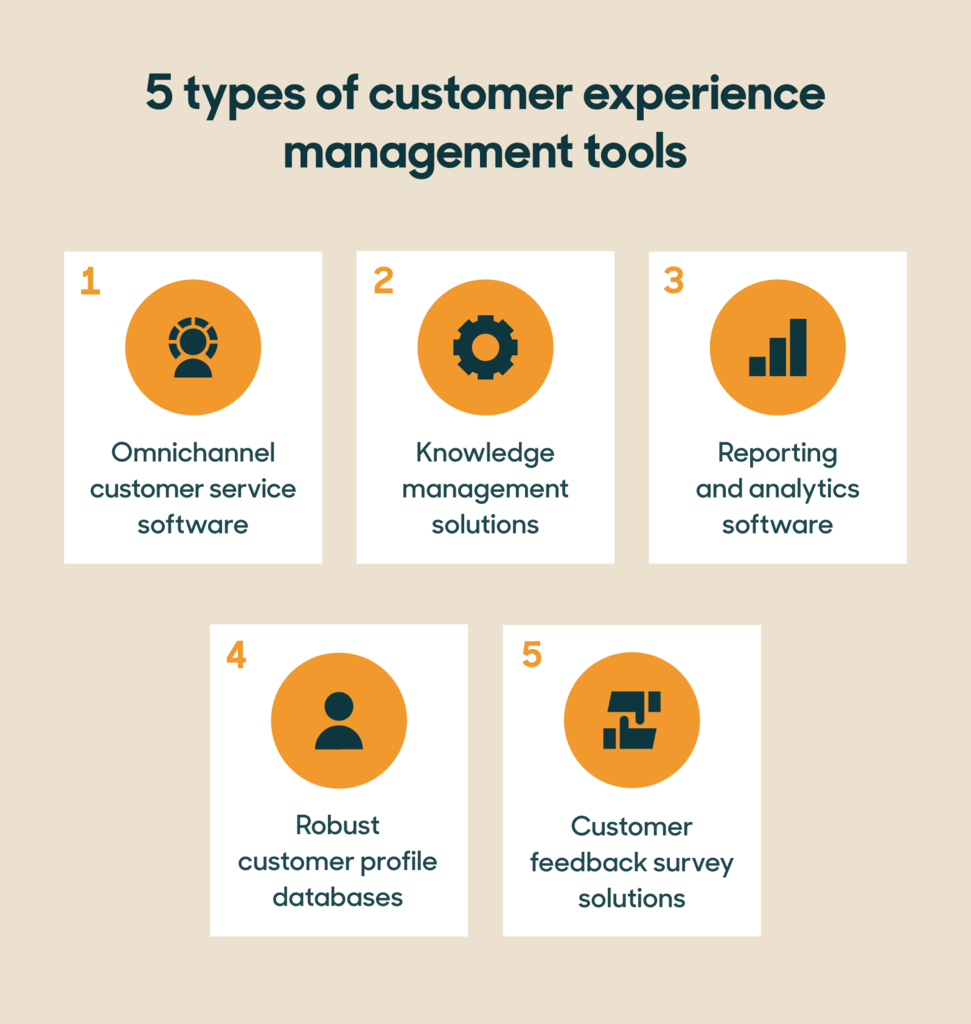
Image Source: Zendesk
The Top All-in-One CX Platforms Ranked
1. Sogolytics (SogoCX)
Best for: Organisations wanting complete enterprise-grade CX capabilities with faster deployment, better support, and significantly lower total cost of ownership.
Sogolytics earns the top position by delivering something the CX market has needed for years: an all-in-one customer experience solution that matches enterprise analytical depth without the enterprise price tag, implementation timeline, or staffing requirements. While competitors force businesses to choose between capability and accessibility, SogoCX delivers both.
The platform covers every dimension of the all-in-one criteria outlined above. Omnichannel collection reaches customers through email, SMS, web, apps, QR codes, and social media. Automated distribution flows trigger feedback requests based on customer actions, ensuring continuous, fresh data without manual campaign management.
Analytical capabilities rival platforms costing twice as much. NPS, CSAT, CES, and fully custom metrics track across every touchpoint simultaneously. Key Driver Analysis pinpoints which specific factors most influence customer satisfaction and loyalty, moving beyond correlation into actionable causation. Natural language processing extracts sentiment, themes, and customer intent from open-ended responses automatically.
The closed-loop workflow engine is where SogoCX transforms measurement into operational impact. Critical feedback triggers automatic alerts to relevant teams. Tickets log for follow-up. Resolution tracking ensures nothing falls through the cracks. At-risk customers get identified and addressed before they become former customers. This operational capability distinguishes platforms that actually reduce churn from those that merely report on it.
CX dashboards serve multiple stakeholder levels simultaneously. Executive views present strategic metrics with trend analysis across locations, segments, and time periods. Operational views provide the detail managers need for tactical decisions. Drill-down capabilities let anyone move from high-level patterns to individual customer feedback in clicks.
Integration capabilities connect with Salesforce, Tableau, and other business-critical tools natively. Zapier compatibility enables multi-tool automation workflows. Full API access supports completely custom connections. HTTP targets push response data directly to third-party applications in real time.
Three factors combine to justify the top ranking specifically.
- First, pricing. SogoCX delivers capabilities comparable to Qualtrics and Medallia at up to 50 per cent lower cost. Organisations currently spending $80K to $150K annually on legacy enterprise platforms can achieve comparable outcomes at dramatically reduced investment. For mid-market companies, this means accessing enterprise-grade CX management on realistic budgets.
- Second, usability. Enterprise CX platforms typically require trained administrators and months of implementation. SogoCX deploys faster, and teams adopt it without extensive training. This accelerates time to value, meaning you start capturing actionable insights sooner rather than spending months in setup.
- Third, support. Round-the-clock assistance from a knowledgeable, responsive team means urgent issues get resolved promptly rather than languishing in ticketing queues. Users consistently highlight personalised, 24/7 support as a primary differentiator. No national call centre queues. No chatbot runaround. Real experts providing real help when you need it.
The client roster validates enterprise capability conclusively. Apple, Dell, FedEx, IBM, Sony, PepsiCo, Cisco, Accenture, and Citibank trust Sogolytics with their customer experience data. These organisations demand enterprise security, analytical rigour, and operational reliability. Their continued use confirms the platform delivers at the highest standards while remaining accessible to organisations without Fortune 500 budgets.
- Strengths: Enterprise-grade analytics at up to 50% lower cost than competitors, intuitive interface eliminating adoption friction, industry-leading 24/7 support, comprehensive closed-loop action workflows, proven at Fortune 500 scale while remaining accessible to mid-market.
- Limitations: Lower brand recognition than Qualtrics and Medallia in legacy enterprise procurement conversations, smaller consulting partner ecosystem than long-established market incumbents.
- Pricing reality: Up to 50 per cent less than comparable enterprise offerings. Transparent pricing without hidden cost escalation. The best value proposition in the enterprise CX market.
2. Qualtrics Experience Management
Best for: Large enterprises with dedicated experience management teams, complex research needs, and substantial budgets.
Qualtrics defined the experience management category and offers the most feature-rich platform available. Their XM operating system spans customer, employee, product, and brand experience in a genuinely unified framework.
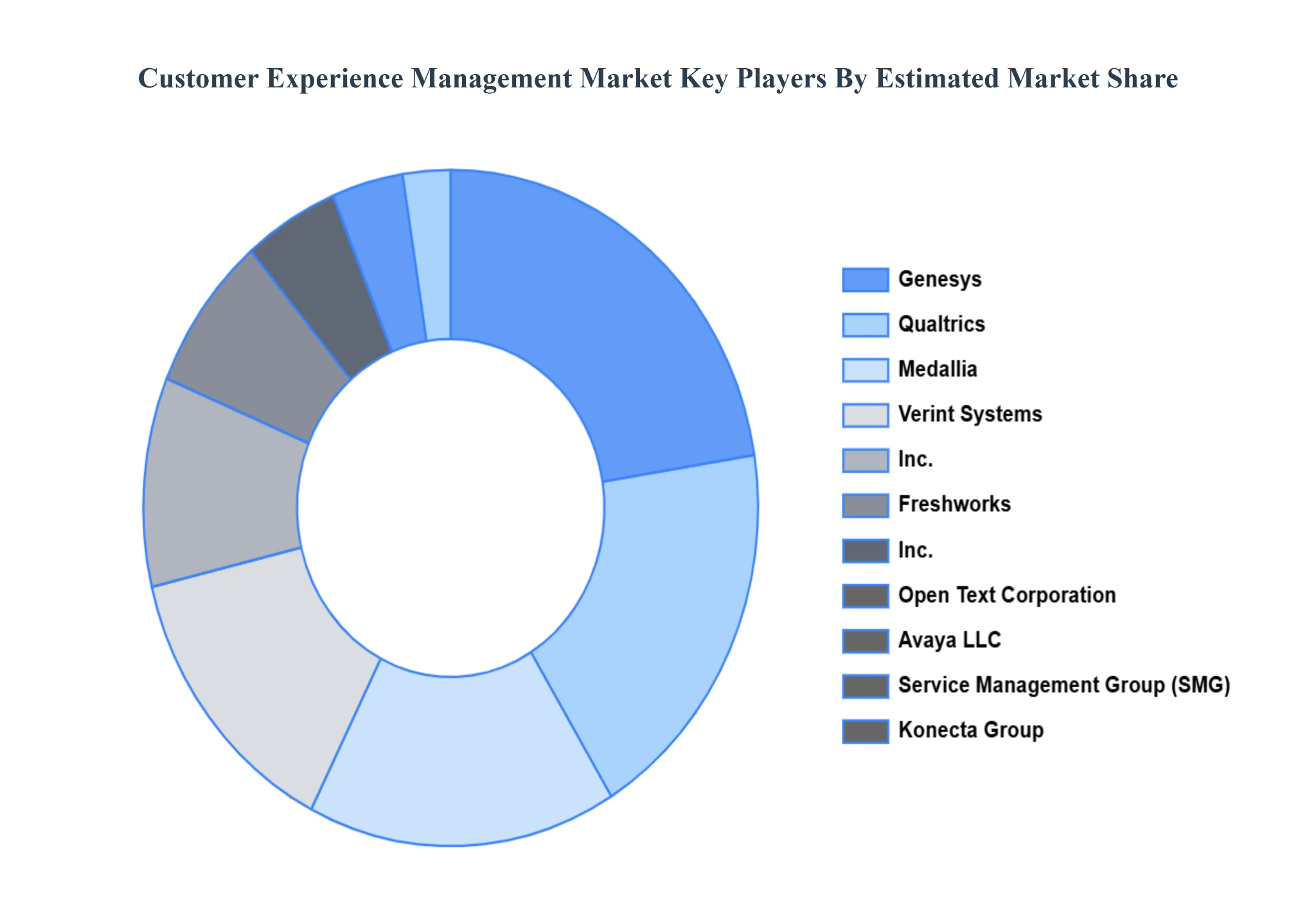
Image Source: Verified Market Research
Analytical depth is the platform's defining strength. Predictive intelligence models identify churn risk before behavioural signals become obvious. Statistical tools support complex research designs that academic researchers would recognise. Text analytics processes millions of open-ended responses with sophisticated language models.
The platform's breadth extends beyond customer experience into employee engagement, product feedback, and brand tracking. Organisations wanting a single experience management system across all stakeholder types find comprehensive capability here.
Survey design flexibility accommodates virtually any feedback methodology. Complex logic, randomisation, conjoint analysis, and MaxDiff studies all execute natively. Research teams accustomed to dedicated survey platforms find equivalent capability within Qualtrics.
Integration infrastructure connects with major enterprise systems comprehensively. Salesforce, SAP, ServiceNow, Marketo, and dozens of others integrate natively. Custom API capabilities handle unique requirements.
The trade-offs keep Qualtrics from the top position. Pricing commonly reaches six figures annually for meaningful enterprise deployments. Implementation timelines stretch across months. Operating the platform effectively requires trained specialists, often multiple full-time employees dedicated to the system.
Smaller organisations purchasing Qualtrics frequently discover they are paying for capabilities they lack the resources to use. The platform's comprehensive nature becomes a burden when teams cannot leverage its depth. For organisations seeking a more cost-effective all-in-one customer experience solution, enterprise-heavy platforms like Qualtrics may introduce unnecessary complexity and expense.
- Strengths: Deepest analytical capabilities available, broadest experience management scope, most extensive enterprise integration ecosystem, sophisticated research methodology support.
- Limitations: Premium pricing excludes most mid-market organisations, requires dedicated administrators, and implementation complexity delays time to value significantly.
- Pricing reality: Expect $100K+ annually for enterprise deployments. Mid-market packages exist but limit capabilities meaningfully.
3. Medallia
Best for: Enterprises processing massive volumes of experience signals across diverse channels simultaneously.
Medallia's core strength is signal processing at an extraordinary scale. Their platform ingests experience data from surveys, social media, call transcripts, chat logs, video feedback, IoT sensors, and dozens of other sources concurrently. For organisations generating millions of customer interactions monthly, this intake capability remains unmatched.
AI and machine learning capabilities identify patterns across enormous datasets. Predictive models forecast customer behaviour with statistical confidence. Emerging issue detection surfaces problems while they affect small customer segments, rather than waiting until customer experience trends become obvious.
The platform excels at capturing unsolicited feedback alongside structured surveys. Social listening, review aggregation, and operational signal processing create experience views that survey-only platforms cannot replicate. This comprehensive signal capture provides a more complete customer picture.
Industry-specific solutions for hospitality, retail, financial services, telecommunications, and healthcare include pre-built frameworks, benchmarks, and best practices. These vertical solutions accelerate deployment for organisations in supported industries.
Medallia acquired several specialist companies to expand capabilities, including Zingle for messaging, LivingLens for video analytics, and Decibel for digital experience analytics. These acquisitions broadened the platform but occasionally create integration seams between originally separate products.
Cost and complexity present barriers comparable to Qualtrics. Enterprise pricing typically requires six-figure annual commitments. Professional services engagement is frequently necessary for customisation. Smaller organisations find the platform overbuilt and overly expensive for their actual requirements.
- Strengths: Unmatched experience in signal processing volume, sophisticated AI and predictive analytics, comprehensive unsolicited feedback capture, and strong industry-specific frameworks.
- Limitations: Enterprise pricing structure, implementation complexity requiring professional services, and acquisitions creating occasional integration inconsistency.
- Pricing reality: Comparable to Qualtrics. Expect significant annual investment for full platform access.
4. Freshdesk Customer Service Suite
Best for: Growing businesses wanting CX capabilities tightly integrated with customer support operations.
Freshworks built their customer service suite around the customer insight that support interactions represent the highest-stakes customer experience moments. Their platform combines ticketing, messaging, voice, and feedback in a unified environment.
The integration between operational service delivery and experience measurement creates natural feedback loops. Customer satisfaction surveys trigger automatically after interactions. Sentiment analysis tracks alongside operational metrics. The connection between service quality and customer sentiment becomes visible without manual analysis.
Pricing accessibility makes Freshworks attractive to mid-market organisations. Their tiered model scales from basic to enterprise capabilities without requiring massive upfront commitment. Free tiers for basic functionality let teams evaluate before investing.
AI capabilities through Freddy AI assist agents, automate routine interactions, and analyse customer sentiment across support conversations. These capabilities improve with platform usage as models train on your specific customer interactions.
CX analytical depth trails dedicated experience management platforms. The platform measures experience well within the support context but provides less capability for broader journey measurement, product feedback, or proactive research.
- Strengths: Strong support-CX integration, accessible pricing, AI-assisted service capabilities, and rapid deployment.
- Limitations: CX measurement focuses primarily on support interactions, analytics trail dedicated CX platforms for strategic analysis, and journey mapping capabilities are limited.
- Pricing reality: Significantly more accessible than enterprise CX platforms. Tiered pricing scales with actual needs.
5. Zoho CX Suite
Best for: Zoho ecosystem organisations wanting CX measurement without adding external vendors.
Zoho's extensive product suite includes capabilities through Zoho Survey, Zoho Desk, and Zoho CRM, working in combination saving from customer experience fails. For organisations already invested in the Zoho ecosystem, these tools provide CX measurement without vendor proliferation.
The unified data environment across Zoho products creates customer visibility spanning sales, support, and feedback. Survey responses connect to CRM records automatically. Support interactions enrich customer profiles. This integration happens natively without third-party connectors.
Pricing remains among the most accessible in the market. Zoho's cost-efficiency philosophy extends to its CX capabilities. Small and mid-market businesses access functional CX measurement at price points that enterprise platforms cannot approach.
The trade-off is that CX capabilities are distributed across multiple Zoho products rather than unified in a single purpose-built platform. Assembling the complete CX picture requires configuring connections between Zoho Survey, Zoho Desk, and Zoho Analytics. This is simpler than connecting entirely separate vendors ,but still requires deliberate setup.
Analytical capabilities serve operational needs competently. Strategic CX analysis requiring advanced statistical methods, predictive modelling, or sophisticated text analytics may exceed what the combined Zoho tools deliver natively.
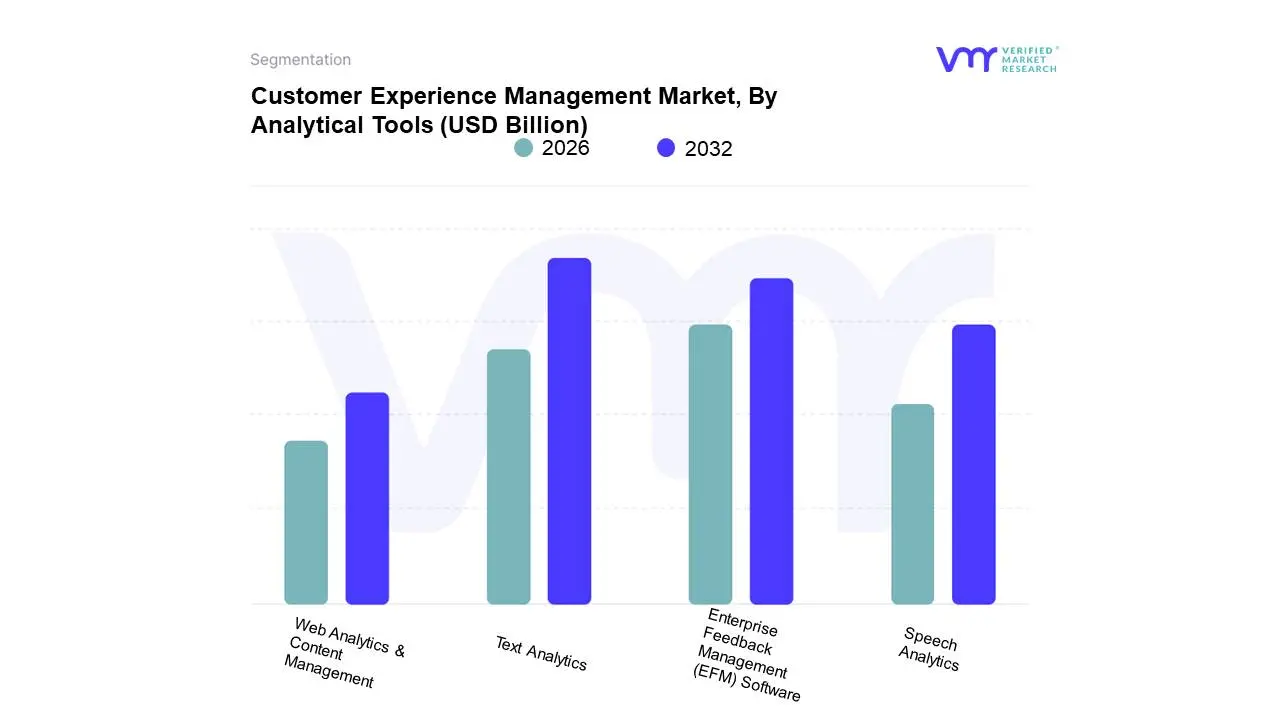
Image Source: Verified Market Research
- Strengths: Exceptional pricing, native Zoho ecosystem integration, unified customer data across business functions.
- Limitations: CX capabilities are spread across multiple products rather than unified, analytical sophistication trails dedicated platforms, and setup requires deliberate cross-product configuration.
- Pricing reality: Among the most affordable options available. Particularly cost-effective for existing Zoho customers.
6. HubSpot Service Hub
Best for: HubSpot-committed organisations adding CX measurement to existing marketing and sales operations.
HubSpot's Service Hub extends its CRM platform into customer experience territory. Feedback tools, knowledge base management, and customer portal capabilities add post-sale measurement to HubSpot's established pre-sale strengths.
The lifecycle visibility across marketing, sales, and service touchpoints provides context that standalone CX platforms lack entirely. Understanding which acquisition channels and sales processes produce the most satisfied customers informs both experience design and revenue strategy simultaneously.
Customer feedback tools handle standard customer success metrics within the familiar HubSpot interface. NPS, CSAT, and custom surveys deploy without learning new systems. Results connect to contact records automatically, enriching customer profiles with experience data.
Automation capabilities leverage HubSpot's established workflow engine. Feedback-triggered actions, follow-up sequences, and team notifications execute through the same automation tools marketing and sales teams already understand.
CX-specific analytical depth remains a limitation. Organisations requiring key driver analysis, advanced text analytics, or sophisticated predictive modelling will find capabilities insufficient for mature CX programmes.
- Strengths: Seamless CRM integration, complete customer lifecycle visibility, familiar interface for HubSpot users, strong automation capabilities.
- Limitations: CX analytics are insufficient for mature programmes, feedback collection is less sophisticated than dedicated platforms, and pricing escalates significantly at enterprise tiers.
- Pricing reality: CX capabilities require Service Hub Professional or Enterprise tiers. Total HubSpot investment across hubs accumulates quickly.
7. SurveyMonkey Enterprise
Best for: Organisations needing simple, familiar feedback collection with basic CX reporting.
SurveyMonkey's brand recognition and ease of use make it many organisations' first CX tool. Creating surveys requires minimal training. Templates for standard CX metrics get teams collecting feedback within hours.
The platform handles basic feedback collection and reporting competently. Simple surveys are distributed through multiple channels. Standard reports visualise results clearly. For organisations with straightforward feedback needs, SurveyMonkey delivers adequate functionality.
Enterprise features, including team management, compliance controls, and enhanced security, address larger organisation requirements. Integrations with Salesforce, Marketo, and other business tools enable basic data connectivity.
Limitations surface as CX programmes mature beyond basic measurement. Advanced analytics, including key driver analysis, predictive modelling, and sophisticated NLP, either lack depth or require premium tiers. Closed-loop action workflows are minimal compared to purpose-built CX platforms.
The all-in-one claim stretches thin under scrutiny. SurveyMonkey collects feedback effectively but provides limited journey mapping, basic closed-loop capabilities, and analytics that serve reporting needs rather than strategic decision-making.
- Strengths: Unmatched brand familiarity, fastest time to first survey, accessible pricing entry points, and a simple interface requiring zero training.
- Limitations: Analytics ceiling restricts strategic CX analysis, closed-loop workflows trail dedicated platforms significantly, journey mapping and touchpoint management are minimal.
- Pricing reality: Affordable at entry tiers. Enterprise capabilities require premium pricing that narrows the cost gap with more capable platforms.
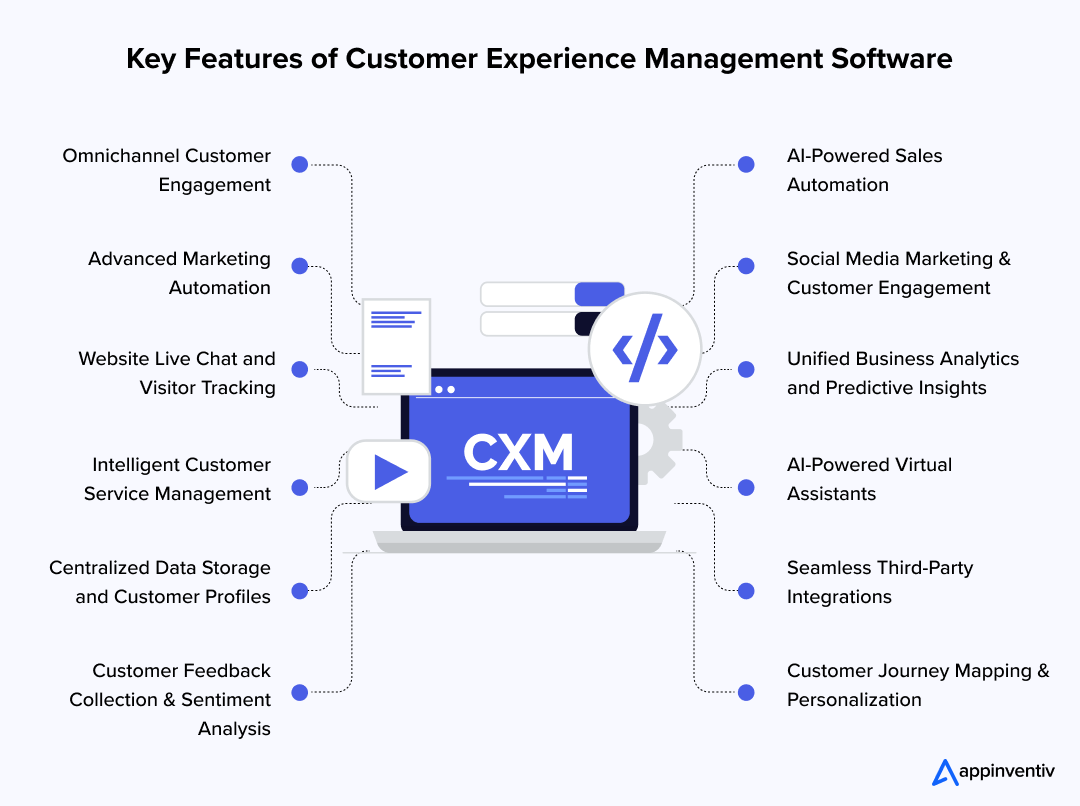
Image Source: Appinventiv
Point Solutions vs All-in-One: When Each Makes Sense
Not every organisation needs a unified platform immediately. Understanding when point solutions work and when consolidation delivers superior value guides investment decisions.
- Point solutions make sense when you are just beginning CX measurement and need to prove value before committing to a platform. A simple survey tool collecting initial feedback demonstrates ROI that justifies later platform investment.
- Consolidation makes sense when you have feedback data in multiple tools, teams drawing conflicting conclusions from different data sources, or customers receiving multiple disconnected surveys from different departments. These symptoms indicate that fragmentation is actively harming your CX programme.
- All-in-one platforms pay for themselves when the cost of integrating, maintaining, and reconciling multiple point solutions exceeds the cost of a unified platform. For most organisations, this tipping point arrives sooner than expected.
Marketing and agency platforms like DashClicks can centralise campaign performance, lead tracking, and client reporting. However, they do not replace a dedicated CX platform, since they focus on marketing analytics rather than holistic customer journey measurement.
Making Your Decision
The right platform balances capability with usability at a price point your organisation can sustain long-term. The most powerful platform your team cannot operate wastes money. The simplest platform your programme outgrows within a year wastes time.
Start by assessing your actual requirements honestly. List the channels where you need feedback. Identify the analyses that would change decisions. Define the actions you want feedback to trigger. Map these needs against platform capabilities rather than feature lists.
Request demonstrations using your real scenarios. Generic product tours showcase best-case presentations. Your actual use cases reveal whether a platform handles your specific complexity.
Evaluate the total cost of ownership, including implementation, training, and ongoing administration. A platform costing 50 per cent less but delivering equivalent analytical depth and superior support often provides better long-term value than premium alternatives.
Trial periods reveal truths that sales conversations cannot. Most platforms offer evaluation periods. Use them with real data and real team members before committing.
Your customers already form opinions about every interaction with your business. The right all-in-one platform helps you capture those opinions systematically, understand them deeply, and act on them before dissatisfaction becomes defection. Choose the platform that makes this achievable for your organisation today and scalable for where you are heading tomorrow.


6 Best Proxies for Ad Verification in 2026
Ad verification confirms that ads render correctly and appear in the intended context, location, and placement, without deceptive redirects or manipulated inventory. According to WARC (January 2026), global advertising spend is forecast to grow 9.1% in 2026 to about $1.3 trillion. Higher spend spread across more platforms and geos raises the cost of misdelivery, so verification teams need reliable sampling that reflects real regional outcomes rather than one office network view.
Verification only works when checks resemble real browsing conditions. Platforms personalize content by location and network signals, and they react quickly to repeated scans from the same address. Proxies help teams keep testing consistent while still sampling enough viewpoints to trust the result.
What Is Ad Verification?
It measures whether ad delivery matches the intended settings and whether the ad experience stays safe and consistent across environments. Teams treat it as an evidence process, not a screenshot task, because repeatability matters more than one-off observations. Clear definitions keep results comparable across geos, devices, and publishers.
What Teams Actually Check?
Teams check creative rendering, visible placement, and surrounding content for brand safety signals. They also review redirect chains and landing behavior because malicious or misleading routes often appear only in specific conditions. Consistent checks track mismatches such as wrong geo delivery, missing disclosures, or unexpected pop-ups.
Why IP Identity Changes the Result?
Platforms use IP-based signals to localize content, enforce policies, and rate-limit suspicious traffic. One corporate IP can trigger blocks that hide the real user experience or force alternate content. Multiple network identities produce a truer sample of what audiences see in different locations.
Why Do Proxies Matter for Ad Verification?
Proxies let teams test delivery from controlled network identities rather than a single-office connection. That control prevents narrow sampling from turning into false confidence. It also reduces failures when targets throttle or block repetitive validation traffic.
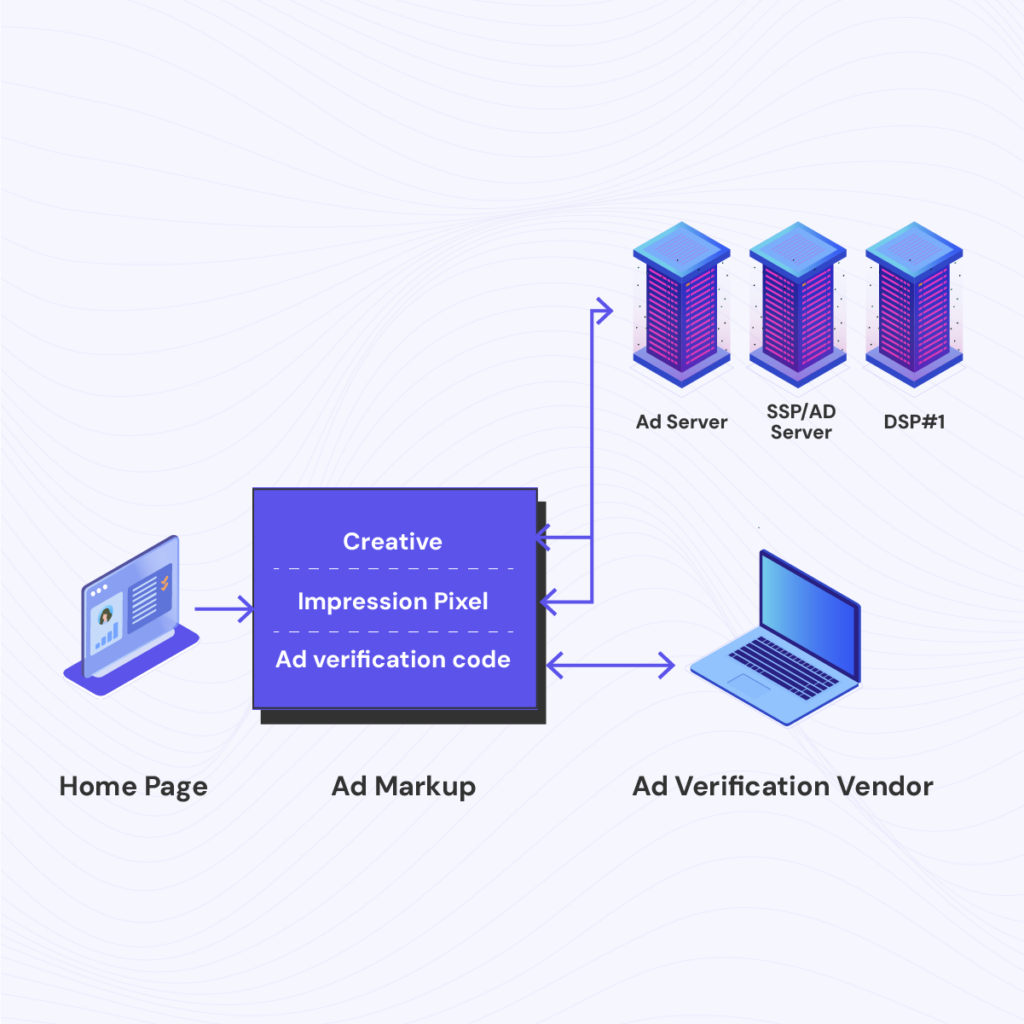
Image Source: ProxyJet
This section lists the highest-impact reasons proxies shape verification results.
- Geo-Accurate Sampling: Location-matched IPs expose how ads and landings change across markets.
- Block Resistance: Distributed IPs reduce repetitive request patterns that trigger friction and soft bans.
- Repeatable QA Baselines: Consistent IP profiles make it easier to compare results across runs and spot real delivery changes instead of random network noise.
- Publisher and Network Parity: Different networks can change what loads and how fast they load, which helps explain delivery gaps across environments.
- Brand Safety Spot Checks: Different IP identities can surface risky placements or surrounding content that does not appear from one fixed network.
- Redirect Chain Validation: Stable identity options make it easier to trace multi-hop redirects and confirm the final landing behaves as expected.
- Geo Compliance Validation: Controlled locations help confirm that restricted offers, disclosures, and consent flows appear where policies require them.
For agencies managing multiple client accounts, proxy-enabled verification is typically integrated into broader campaign management stacks. Using platforms like DashClicks for reporting and client-facing visibility while proxies handle geo-validation allows teams to connect delivery verification directly to measurable campaign outcomes.
Which Proxy Types Fit Ad Verification Workflows?
Different IP types fit different validation goals, and the wrong match creates noisy outcomes. Trust signals and network context affect what loads, what gets challenged, and what inventory appears. A good workflow assigns proxy types by publisher strictness and check depth.
- Residential Proxies: Residential IPs resemble home browsing and help validate sensitive placements where trust signals affect delivery. They support checks where a datacenter identity would trigger blocks or altered content. Teams often use them for publisher inventory sampling and brand safety validation.
- Mobile Proxies: Mobile IPs reflect carrier networks and help validate in-app and mobile-first delivery behavior. They make sense when the creative, landing speed, or tracking flows differ on mobile traffic. Teams use them to confirm mobile-only targeting and carrier-linked variations.
- ISP and Datacenter Proxies: ISP IPs provide a stable identity for multi-step checks that need continuity across redirects and sessions. Datacenter IPs can support lightweight monitoring on lower-friction targets where speed matters more than trust. Teams often separate these roles to avoid mixing results across very different network identities.
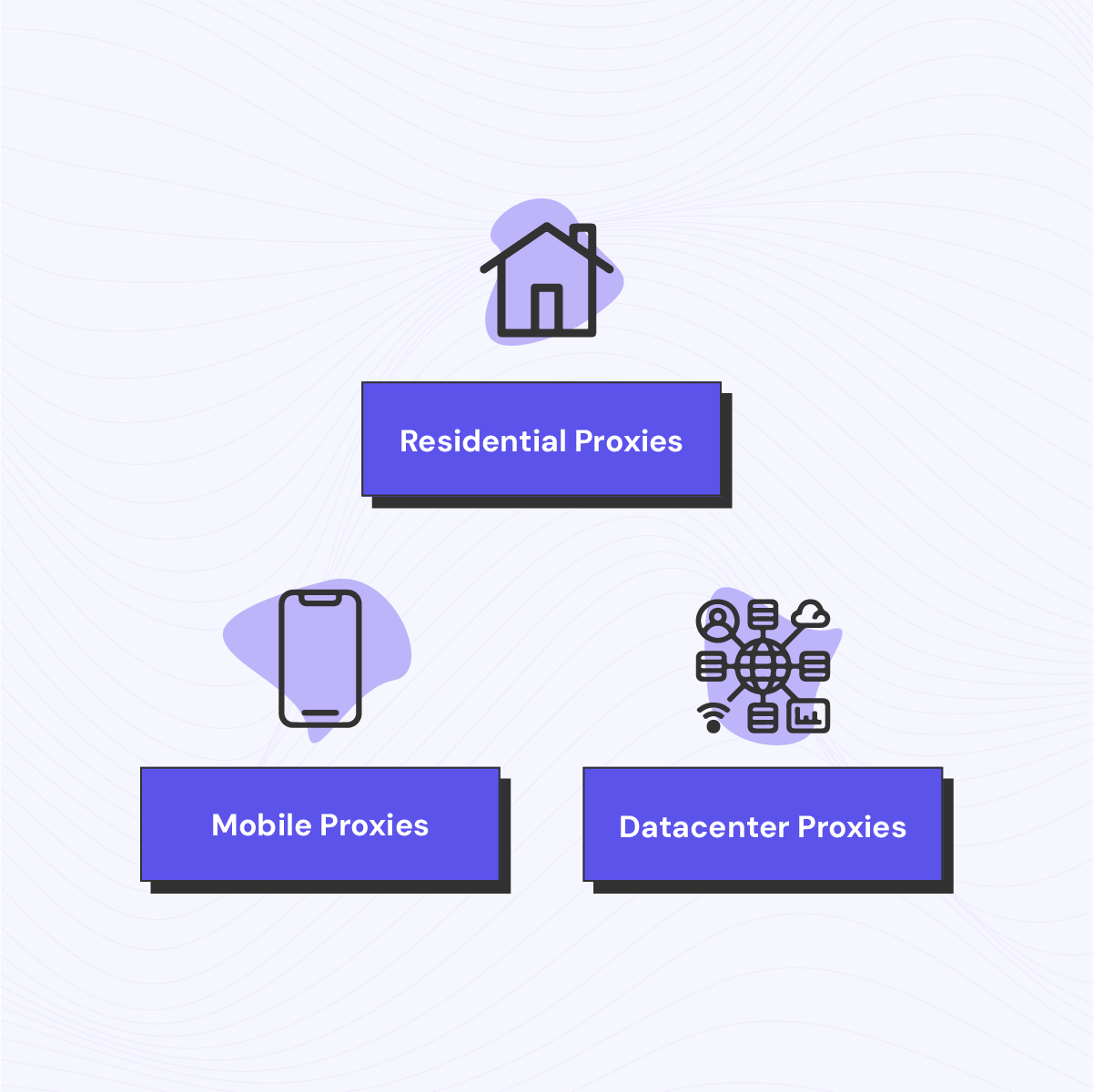
Image Source: ProxyJet
For agencies offering white label PPC services, verification forms part of the quality assurance layer. While platforms such as DashClicks handle campaign deployment and reporting, proxy-based verification helps validate real-world ad delivery across markets.
When Does a Rotating Proxy Improve Ad Checks?
A rotating proxy improves coverage when verification needs many viewpoints without reusing the same address repeatedly. It supports broad sampling across publishers and locations while lowering pattern-based blocking. It works best when rotation aligns to task boundaries so results stay consistent. Rotation adds the most value in these cases.
- High-Volume Sampling: Rotation expands coverage across many placements without rapid IP reuse.
- Geo Sweeps: Rotation supports city or region checks without narrowing visibility to a few IPs.
- Fraud and Cloaking Spot Checks: Rotation helps surface conditional behavior that appears only for certain IP reputations or locations, which makes anomalies easier to catch without overfitting to one identity.
Which Proxies Are the Best for Ad Verification in 2026?
The best options combine clean IP reputation, reliable geo targeting, and session controls that keep identity stable through redirects and landing checks. Strong providers also offer enough proxy variety to match different risk levels across publishers, ad networks, and verification endpoints.
The following list highlights six providers that fit ad verification workflows in 2026.
- Live Proxies: Private allocation and session controls built for strict targets and repeatable verification runs.
- Oxylabs: Enterprise proxy portfolio with large pools and broad protocol support for high-scale verification.
- Decodo: Balanced proxy mix with extensive residential coverage and automation-friendly setup for daily verification.
- SOAX: Precise geo targeting with residential, mobile, ISP, and datacenter options suited to geo-based ad QA.
- DataImpulse: Residential plus mobile and datacenter options designed for scalable checks and geo sampling.
- Webshare: Self-serve proxy stack with residential and datacenter access and SOCKS5 availability for flexible tooling.
Let’s take a quick comparison.
1. Live Proxies
Live Proxies fits ad verification teams that need stable identity signals on strict targets and predictable control over IP reuse. The network positions itself around private usage, with millions of IPs across 55+ countries for enterprise workflows. A rotating proxy setup helps spread verification requests across clean residential IPs without repeating the same address too often on strict publishers.
Sticky sessions run up to 24 hours, which supports multi-step checks that must keep the same IP through redirects and landing validation. Rotating residential is positioned with 99.9% uptime, and the stack supports HTTP, HTTPS, and SOCKS5 for common automation clients.
Proxy Types for Ad Verification
- Rotating Residential Proxies: Built for geo sampling and high-volume coverage where clean resets matter between checks.
- Rotating Mobile Proxies: Built for carrier-like delivery paths where mobile inventory behaves differently than broadband traffic.
Features
- Private Allocation Model: The service frames allocation is around reducing cross-tenant overlap on the same targets for stricter endpoints.
- Session Control: Sticky sessions up to 24 hours keep identity stable during multi-step flows, and rotation supports batch coverage.
- Live Proxies Proxy Tester: A tool that validates a proxy string end-to-end and returns quick diagnostics like location and connection timing before scheduled ad verification runs.
2. Oxylabs
Oxylabs advertises a 175M+ residential proxy pool and positions it for high-scale collection with broad global coverage. It also publishes advanced targeting options that include country, state, city, ZIP, and ASN, which helps when ad delivery shifts at the city level or by network.
It offers SOCKS5 access and highlights unlimited concurrent sessions for traffic-intensive workflows. For protected endpoints, Oxylabs provides managed unblocking products that reduce interruptions during verification runs.
Proxy Types for Ad Verification
- Residential Proxies: Used for strict inventory where consumer-like identity affects delivery and rendering.
- Mobile Proxies: Used for mobile placements where carrier context changes outcomes.
- ISP Proxies: Used for a stable identity when a long flow needs continuity.
- Datacenter Proxies: Used for fast monitoring passes on lower-friction endpoints.
Features
- Advanced Targeting Controls: Supports targeting layers such as ASN and ZIP when verification needs controlled network identity.
- Unlimited Concurrent Sessions: Designed for high-throughput checks that must run in parallel.
3. Decodo
Decodo advertises 115M+ residential IPs from 195+ locations and publishes a 99.86% success rate for its residential network. The platform also highlights state, city, and ASN-level targeting, which fits repeatable geo sampling rules.
A company positions Site Unblocker and Web Scraping API as options for pages that break under normal proxy checks due to CAPTCHA, bans, or heavy JavaScript. This mix fits teams that want both raw proxy access and a managed fallback path.
Proxy Types for Ad Verification
- Residential Proxies: Used for geo sampling and consumer-like access on strict publishers.
- Mobile Proxies: Used for carrier-context checks and mobile-first delivery paths.
- ISP Proxies: Used when a stable identity improves repeatability across longer validations.
- Datacenter Proxies: Used for throughput-focused monitoring where trust requirements are lower.
Features
- Site Unblocker: Handles CAPTCHA and IP bans to keep checks running on protected pages.
- Web Scraping API: Handles JavaScript rendering and returns outputs designed for automation pipelines.
- Targeting Depth: Supports location rules down to state and city, plus ASN-level selection for network consistency.
4. SOAX
SOAX advertises access to 191+ million clean, whitelisted IPs and positions the platform as a combined proxy and Web Data API stack. The Web Data API is described as handling proxies, CAPTCHA, fingerprinting, JavaScript rendering, and session management, which helps when verification endpoints reject raw checks.
Provider also states that the API can return outputs in HTML, JSON, Markdown, or screenshot format, which fits evidence capture workflows. This setup works when teams need both broad sampling and a resilient path for protected pages.
Proxy Types for Ad Verification
- Residential Proxies: Used for strict inventory and geo-accurate ad previews.
- Mobile Proxies: Used for mobile placements where delivery varies by network context.
- ISP Proxies: Used for continuity when verification flows require a stable identity.
- Datacenter Proxies: Used for fast monitoring and low-friction targets.
Features
- Web Data API Output Modes: Returns HTML, JSON, Markdown, or screenshot outputs for verification evidence.
- Protected-Site Handling: Covers CAPTCHA handling, fingerprinting resistance, and rendering for JavaScript-heavy pages.
5. DataImpulse
DataImpulse advertises a residential IP pool of 90M IPs worldwide and positions it for simple integration. The platform describes both rotating and sticky residential proxy modes, which help separate wide publisher sweeps from continuity checks. DataImpulse also states support for HTTPS and SOCKS5 protocols, which fits common ad QA tooling. The service highlights continuous support coverage, which matters when verification runs on schedules.
Proxy Types for Ad Verification
- Residential Proxies: Used for consumer-like identity and geo-accurate sampling.
- Mobile Proxies: Used when mobile delivery differs from broadband behavior.
- Datacenter Proxies: Used for speed-focused monitoring on lower-friction endpoints.
Features
- Rotating And Sticky Modes: Supports both request-level rotation and sticky behavior for deeper validation flows.
- Protocol Support: Supports HTTPS and SOCKS5 for common verification tooling compatibility.
- Global Pool Scale: Positions a 90M worldwide pool to support broad geo sampling without narrow reuse.
6. Webshare
Webshare advertises an 80M+ rotating residential pool sourced from 195 countries and publishes a 99.8% average success rate for the product. It also documents rotation controls through recurring replacements, including schedules like every 5 minutes and once a month. This cadence control helps teams tune identity refresh to match scan frequency and target sensitivity. Webshare positions its setup as self-serve, which suits teams that want quick deployment without complex configuration.
Proxy Types for Ad Verification
- Residential Proxies: Used for geo sampling and stricter sites where consumer-like identity improves fidelity.
- Datacenter Proxies: Used for lightweight monitoring where speed matters more than trust signals.
Features
- Rotation Scheduling: Supports recurring replacement intervals from every 5 minutes to once per month.
- Country Coverage Publishing: States residential coverage across 195 countries for broad sampling.
- Success-Rate Disclosure: Publishes a 99.8% average success rate for rotating residential checks.
What Features Define Ad Verification-Ready Proxies?
Reliable verification depends on accuracy and control, not just speed. Small gaps in location fidelity or session behavior can distort the outcome. Strong proxy features keep checks stable across repeated runs.
- Geo Depth and Consistency: Accurate geo targeting keeps location signals aligned with campaign settings and compliance boundaries. Consistency matters because drift creates conflicting outcomes across repeated checks. Teams validate geo accuracy early to avoid wasting time on misleading samples.
- Session Control and Stability: Session control keeps identity stable through redirects and multi-step landings. Stability reduces forced logouts, captchas, and broken tracking checks. Teams rely on predictable session behavior to separate true delivery issues from test instability.
- Pool Quality and IP Reputation: Clean pools reduce bias caused by flagged or heavily reused addresses. Reputation affects whether pages load normally or fall into challenge modes that alter the experience. Teams monitor block patterns to spot when IP quality skews results.
How Should Proxies Be Tested Before Running Always-on Verification?
A short pilot reveals whether results are repeatable under realistic frequency and load. Testing should mirror real targets, real geos, and real timing patterns rather than synthetic single-page checks. Logs should capture failures and partial loads so teams can tune the workflow. The test plan should stay measurable and practical.
- Success Rate: Track full-load completion across ads, redirects, and landing pages.
- Geo Accuracy: Verify observed location against the intended country or city across repeats.
- Error Patterns: Classify blocks and challenges by type to target the real constraint.
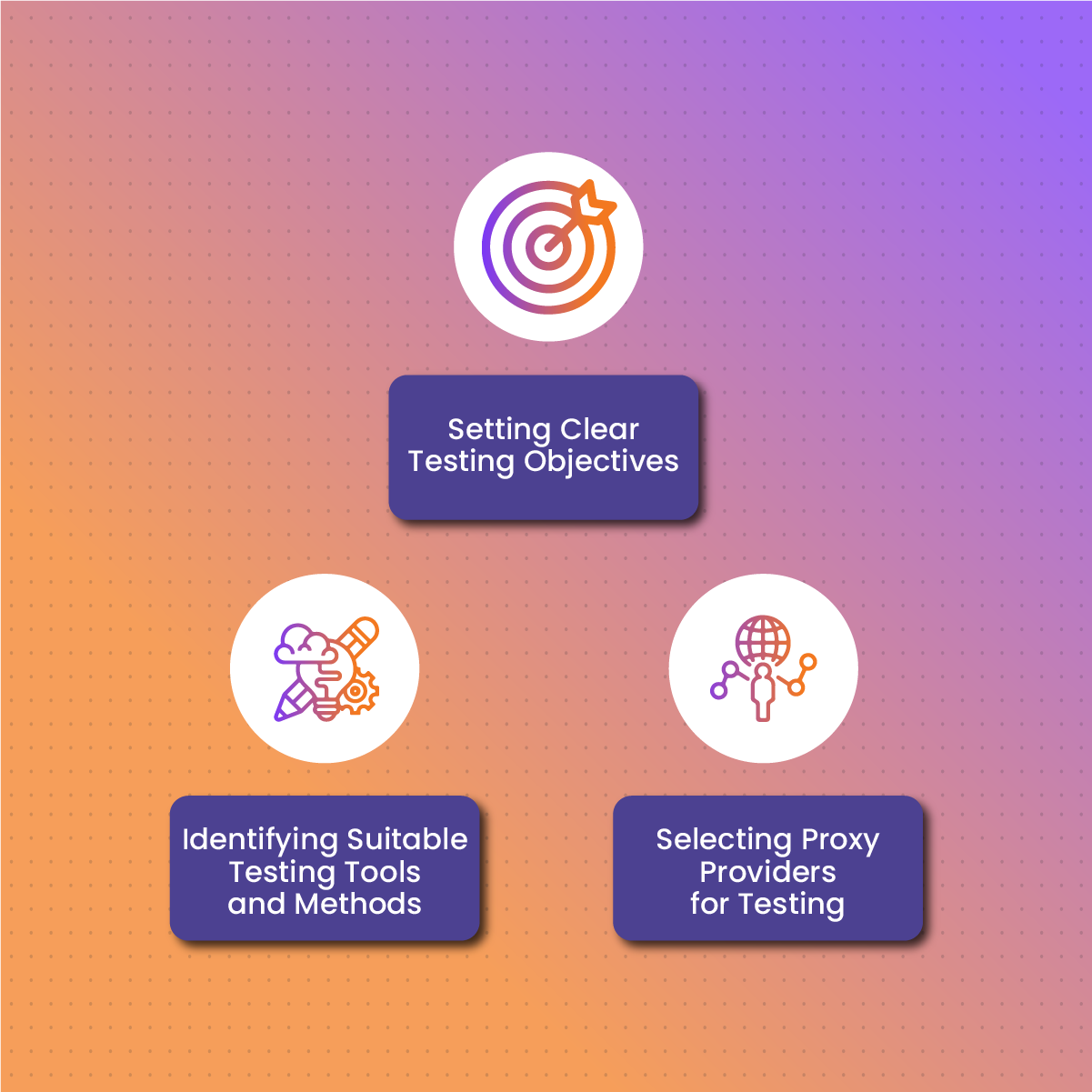
Image Source: NetNut
How Should Ad Verification Be Run Without Skewing Results?
Reliable results come from controlled variables and repeatable sampling rules, not from random scans. Teams get cleaner signals when they separate baseline checks from exploration runs and log the same environment details every time. Stable methodology makes it easier to spot real delivery issues instead of test noise.
A practical workflow stays simple and consistent across publishers and geos.
- Define a Baseline Geo Set: Use the same small set of countries or cities for daily checks so trends stay comparable across weeks.
- Separate Baseline and Exploration: Run baseline checks on fixed schedules, then run separate sweeps for new publishers, new creatives, or anomaly follow-ups.
- Align Session Behavior to the Task: Keep one identity through redirects and multi-step landings, then rotate only between tasks to avoid mixed signals.
- Log What Actually Matters: Record timestamp, geo, device profile, redirect chain outcome, and final landing status so issues reproduce cleanly.
- Throttle Like Real Traffic: Use realistic pacing and concurrency caps per target so results reflect delivery rather than rate-limit reactions.
- Classify Failures by Type: Split blocks, captchas, timeouts, and content mismatches into separate buckets so fixes target the real constraint.
Conclusion
Strong ad verification in 2026 depends on repeatable sampling, clean IP reputation, and session controls that match the depth of each check. Rotating setups improves coverage for broad monitoring, while stable identity improves accuracy for redirects, logins, and multi-step landing validation. Clear logging and disciplined baselines reduce false alarms and help teams isolate real misdelivery patterns across geos and publishers.


How White Label SEO Supports Programmatic & Scalable Content Strategies
Modern digital agencies operate in a high-pressure environment. Clients expect more content, faster results, and clear proof that SEO efforts are driving growth. At the same time, search engines demand relevance, structure, and quality. Balancing all of this across multiple accounts is not easy, especially when content volume keeps increasing.
Programmatic content has become a practical solution to this challenge. It focuses on automated, data-driven content production that targets search demand at scale. Instead of creating every page manually, agencies use structured templates, keyword clusters, and repeatable workflows to publish hundreds or even thousands of optimized pages efficiently.
A scalable content strategy goes beyond volume. It aligns SEO performance with audience intent, conversion goals, and long-term ROI. When done correctly, it helps brands dominate search visibility while maintaining consistent quality across all assets.
This is where white label SEO plays a key role. By partnering with a specialized white label SEO agency, digital firms gain access to experienced teams, proven systems, and advanced tools without expanding their in-house staff. These partners handle research, technical SEO, content production, and optimization behind the scenes, allowing agencies to scale confidently.
The importance of scaling content is backed by data. According to the Content Marketing Institute, content marketing drives roughly 55% of website traffic on average for both B2B and B2C companies in 2024. As competition grows, agencies that cannot scale efficiently risk falling behind in visibility and performance.
White label SEO services help agencies bridge this gap by combining programmatic execution with consistent SEO standards. The result is a content engine that supports growth across multiple clients without sacrificing quality or control.
Why Agencies Struggle to Scale Content Strategies?
1. High Volume vs. Quality Conflict
Scaling content sounds simple on paper. Publish more pages, target more keywords, and grow traffic faster. In practice, this approach often creates tension between volume and quality. As output increases, teams are pushed to move faster, which can lead to shallow research, repetitive phrasing, and weaker on-page optimization.
Many agencies find it difficult to maintain SEO best practices across dozens or hundreds of pages at once. Elements like clear structure, intent alignment, and natural keyword usage are often rushed or overlooked. Readability can suffer as well, especially when multiple writers are working under tight deadlines without unified guidelines.
Search engines now place strong emphasis on experience, expertise, authority, and trust. Pages that lack depth, originality, or logical structure may still get indexed, but they rarely perform well over time. This directly affects key metrics such as:
- Organic traffic per page
- Average time on page
- Engagement and scroll depth
- Keyword ranking stability
When teams are stretched thin, inconsistency becomes unavoidable. A handful of pages may rank and perform well, while others fail to meet even basic SEO standards. Over time, this uneven performance weakens overall site authority and makes growth harder to sustain.
2. Lack of Technical SEO and Content Integration
Content does not exist in isolation. Even the most well-written page needs technical SEO support to rank effectively. Proper keyword mapping, internal linking, schema markup, clean URL structures, and optimized metadata all play a role in how search engines interpret and rank content.
Many agencies focus heavily on writing while treating technical SEO as a separate task or an afterthought. This disconnect creates gaps in execution. Pages may target overlapping keywords, lack internal links, or miss important schema signals that improve visibility in search results.
As content libraries grow, maintaining technical consistency becomes more complex. Small issues such as missing canonical tags, duplicate metadata, or broken internal links can quietly spread across hundreds of pages. Each issue may seem minor on its own, but together they dilute ranking potential and slow growth.
Without a structured SEO framework that ties content and technical elements together, even strong copy can struggle to gain traction. At scale, these gaps become more visible and more damaging.
3. Inefficient Processes and Manual Workflows
Many agencies rely on manual workflows that were never designed for scale. Research, writing, editing, and optimization often happen in silos, with little coordination between teams. Each new client or campaign requires rebuilding processes from scratch.
The lack of repeatable playbooks leads to inefficiency. Writers may follow different guidelines, editors may focus on different priorities, and SEO checks may happen inconsistently. This results in uneven quality and longer turnaround times.
Industry productivity studies show that marketing teams using automated workflows can reduce production time by up to 30%. Agencies that continue to rely on manual methods struggle to keep pace with growing content demands. As a result, deadlines slip, opportunities are missed, and team burnout becomes a real concern.
4. Difficulty in Data-Driven Content Planning
Effective scaling depends on smart planning, not guesswork. Agencies need to identify keyword clusters, understand search intent, and prioritize topics with clear traffic and conversion potential. This requires access to reliable data and the ability to interpret it correctly.
Many teams rely on limited keyword lists or intuition when planning content. Without structured analysis, content calendars often become reactive. Pages are created based on short-term requests rather than long-term strategy.
The lack of strong data insights leads to several issues:
- Low click-through rates due to poor intent matching
- Slower ranking improvements
- Content that competes internally instead of supporting each other
Over time, this weakens the overall content ecosystem and limits sustainable growth.
5. Limited Resources for Testing and Optimization
SEO content is never finished. Pages need regular updates, testing, and optimization to remain competitive. Search behavior changes, competitors publish new content, and algorithms evolve.
Research from Ahrefs shows that updating existing content can improve organic traffic by up to 106% in some cases. Despite this, many agencies focus almost entirely on publishing new pages.
The reason is simple. Most teams lack the time and resources to revisit older content. Audits, refreshes, and performance testing are resource-intensive, especially at scale. As a result, older pages become outdated, lose rankings, and stop contributing meaningful traffic.
6. Client Expectations vs. Operational Capacity
Clients expect clear results. They want consistent content output, measurable SEO ROI, and steady ranking improvements. As competition increases, expectations continue to rise.
Without scalable systems, agencies struggle to meet these demands. Missed deadlines, inconsistent performance, and unclear reporting create friction. Even strong relationships can suffer when execution falls short.
Over time, the gap between client SEO expectations and operational capacity becomes harder to manage. This often leads to dissatisfaction, increased churn, and pressure on margins. Scaling content without reliable support is not just inefficient. It becomes unsustainable for long-term agency growth.
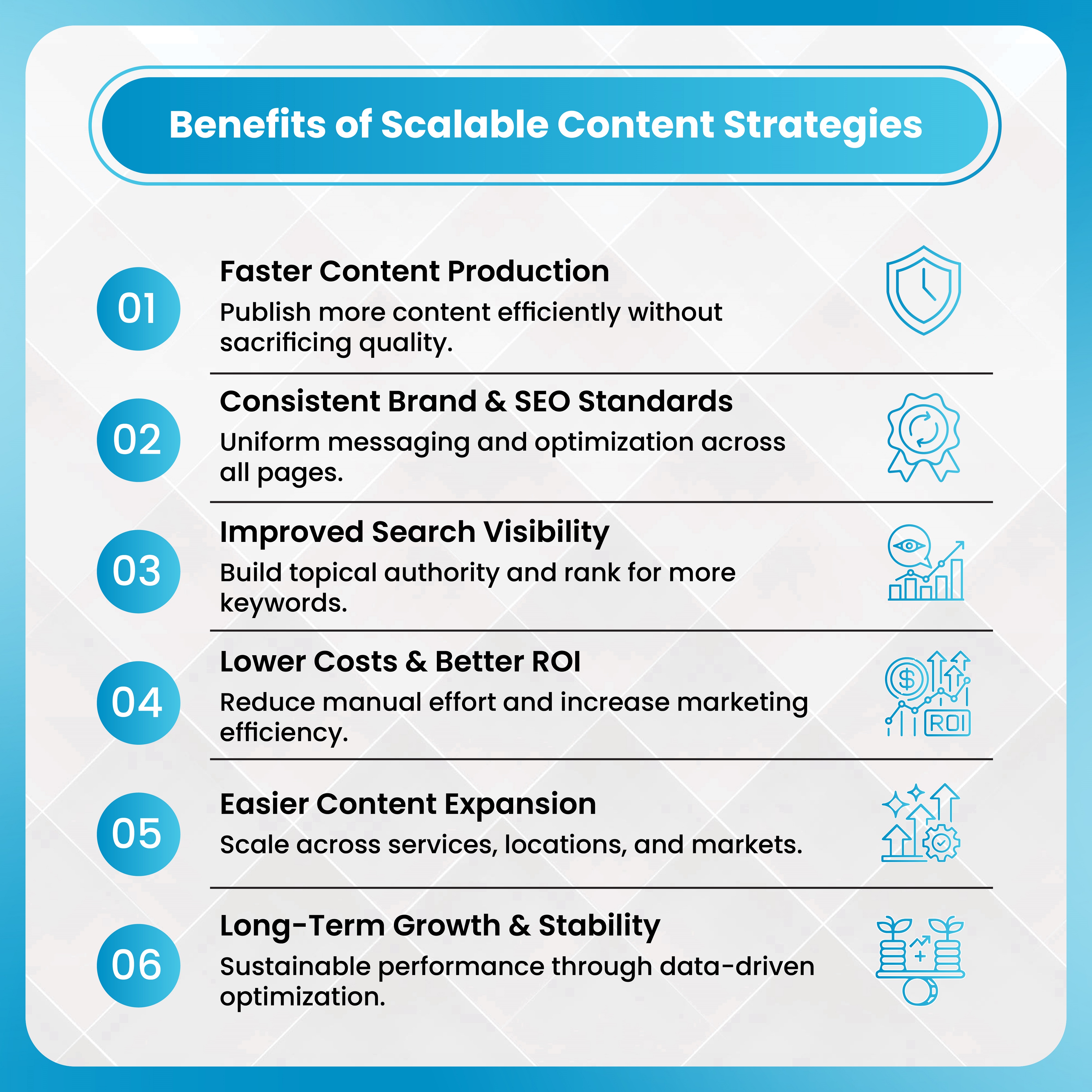
How White Label SEO Enables Programmatic & Scalable Content?
1. Content Research and Strategy at Scale
Scaling content starts with research that goes beyond basic keyword lists. White label SEO teams are built to handle large-scale analysis across multiple clients and industries. They use advanced SEO tools and structured frameworks to uncover keyword opportunities that align with real search demand.
This process includes topic clustering, search intent analysis, and competitor benchmarking. Instead of targeting isolated keywords, content is grouped into related themes that support stronger internal linking and clearer topical authority. This approach helps search engines understand site relevance while improving user experience.
Data-driven content calendars play a critical role at this stage. These calendars are aligned with seasonal trends, search engine result page gaps, and client-specific KPIs such as traffic growth or lead generation. Each piece of content is planned with a defined goal, reducing guesswork and improving performance predictability.
2. Template-Based and Programmatic Content Production
Programmatic content relies on consistency. White label SEO services use standardized frameworks that allow agencies to produce high volumes of content without sacrificing quality. These frameworks include optimized headings, metadata, internal links, and calls to action that follow SEO best practices.
Templates ensure every page meets baseline standards before publication. Writers can focus on relevance and clarity while technical elements are already built in. This reduces errors and speeds up production.
Modular content blocks make scaling even more efficient. Sections such as FAQs, service descriptions, or location details can be reused and adapted across pages. For example, ecommerce or local business websites can generate hundreds of product or location pages using the same structure without duplicating effort.
This structure supports fast expansion while maintaining consistency across large content libraries.
3. Technical SEO Integration
One of the biggest strengths of white label SEO is seamless technical integration. SEO checks are embedded into the content workflow rather than handled as a separate step. This includes schema implementation, canonical tag setup, internal linking, and indexation readiness.
By addressing technical requirements before content goes live, agencies reduce the risk of ranking issues. Pages are easier for search engines to crawl, understand, and index correctly.
This integrated approach improves key performance indicators such as:
- Indexing and crawl efficiency
- Site health scores
- Organic impressions and visibility
Over time, these improvements support more stable and predictable ranking growth.
4. Multi-Client Workflow Automation
Managing content for multiple clients requires systems that scale. White label SEO teams implement workflow automation through editorial calendars, CMS integrations, and approval pipelines. These systems reduce manual coordination and prevent bottlenecks.
Repeatable workflows ensure consistency across accounts. Tasks move smoothly from research to writing, editing, optimization, and publishing. This reduces errors and shortens turnaround times.
According to HubSpot data, companies using marketing automation see an average productivity increase of around 20%. For agencies, this means faster delivery without overwhelming internal teams or sacrificing quality.
5. Content Performance Monitoring and Optimization
Publishing content is only the beginning. White label SEO agencies track performance at the individual asset level. Metrics such as traffic, rankings, engagement, and conversions are monitored continuously.
Underperforming pages are identified quickly and improved through targeted updates. These updates may include keyword refreshes, internal linking improvements, content expansion, or structural adjustments. This iterative process helps content stay relevant as search trends evolve.
Key metrics guide optimization efforts, including:
- Organic click-through rate
- Bounce rate and time on page
- Conversion value and lead quality
This data-driven approach ensures content continues to deliver value long after it is published.
6. Scaling Across Formats and Channels
Scalable content strategies extend beyond blog posts. White label SEO supports a wide range of formats, including landing pages, FAQ sections, product descriptions, and structured data assets.
Content is optimized for mobile devices and different search intents, ensuring a consistent experience across platforms. Assets can also be repurposed for social media, email marketing, or paid campaigns, helping agencies support omnichannel strategies without creating everything from scratch.
This flexibility allows agencies to maximize the impact of each content asset.
7. Rebrandable Reporting and Client Communication
Clear reporting is essential for maintaining trust. White label SEO services provide rebrandable dashboards that present content performance in a clear and accessible way. Clients can see traffic growth, ranking improvements, and ROI without being overwhelmed by technical jargon.
These reports highlight progress and identify opportunities for further growth. Transparent communication strengthens client relationships and reinforces the value of scalable content strategies over time.
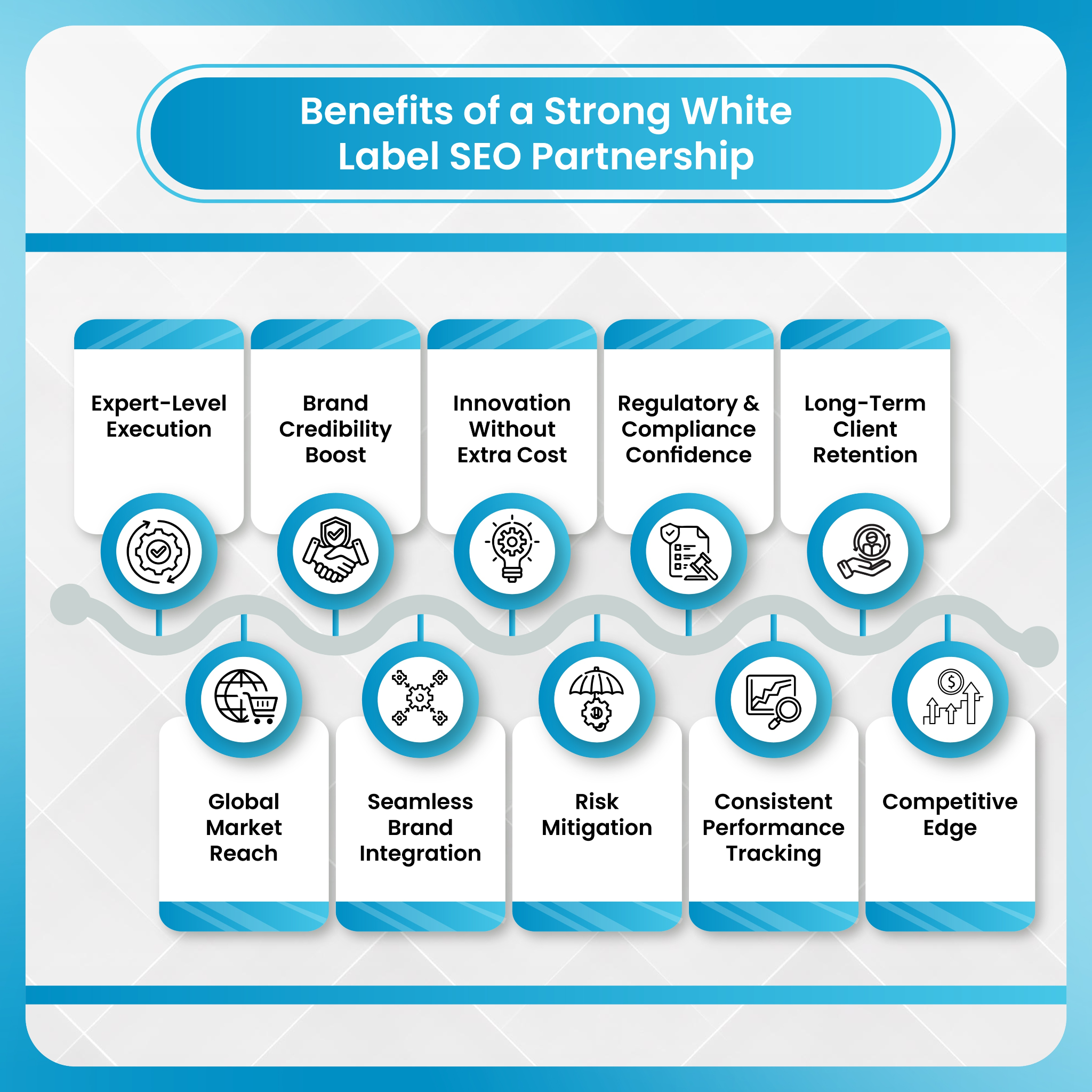
How DashClicks’ White Label SEO Services Enable Programmatic and Scalable Content?
DashClicks supports agencies that want to scale content without increasing operational complexity. Its white label SEO services are built for programmatic execution across multiple clients and industries.
DashClicks helps agencies plan and execute scalable content strategies using data-driven research and keyword clustering. High-opportunity topics are identified at scale, ensuring content aligns with real search demand and client goals.
Programmatic content production is supported through structured templates and modular SEO frameworks. This allows agencies to publish consistent, optimized pages across blogs, service areas, and landing pages without sacrificing quality.
Technical SEO is embedded into every workflow. Schema markup, internal linking, metadata optimization, and indexation support are handled as part of the process, reducing ranking risks.
Performance monitoring is continuous. Agencies gain visibility into traffic, rankings, and engagement, allowing for regular updates and long-term improvements. Rebrandable dashboards make it easy to communicate results and ROI to clients.
By handling execution behind the scenes, DashClicks allows agencies to focus on strategy, relationships, and growth while maintaining full brand control.
Final Thoughts and Next Steps
Programmatic content is no longer optional for agencies aiming to scale. Search competition is increasing, and clients expect consistent growth backed by data. Without the right systems, scaling content becomes inefficient and risky.
White label SEO provides the expertise, tools, and operational support needed to deliver high-quality content at scale. With the right partner, agencies can meet client expectations while protecting margins and resources.
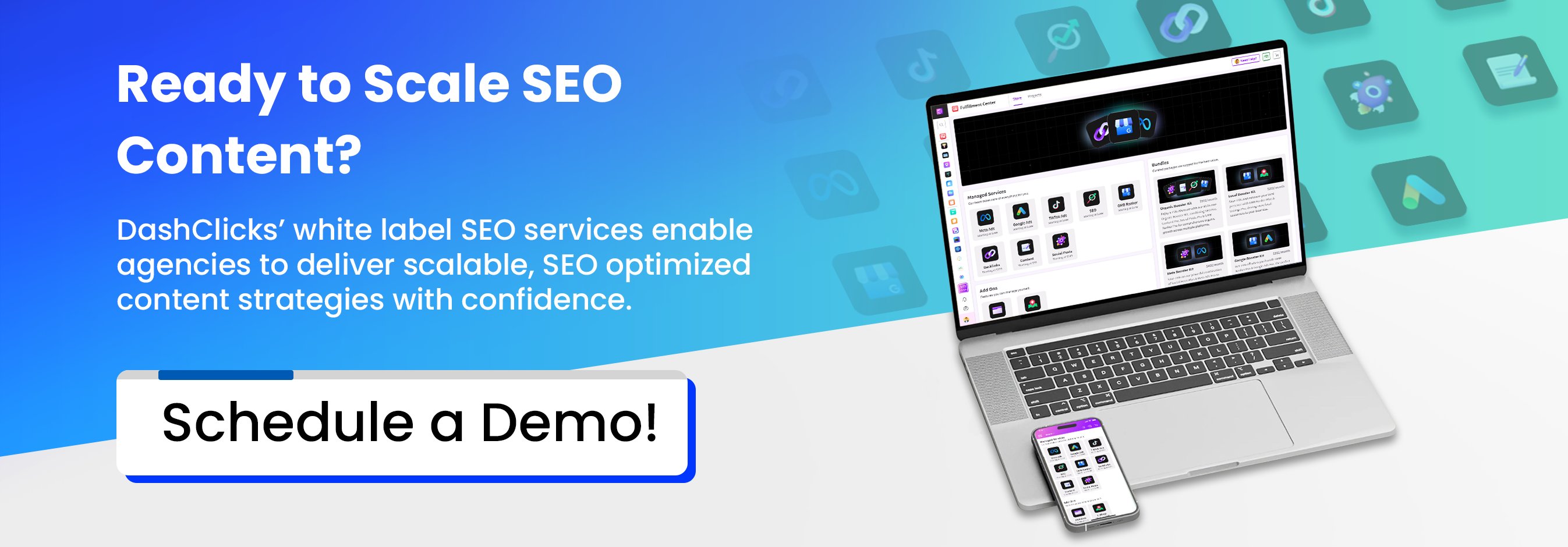

How White Label Facebook Ads Improve Client LTV
Client Lifetime Value, often shortened to LTV, has become one of the most important growth metrics for agencies in 2025. Winning new clients still matters, but keeping them longer and growing each account is where sustainable profit now lives. Rising ad costs, tighter competition, and longer sales cycles mean that relying only on new client acquisition is no longer efficient.
Recent data shows that acquiring a new customer can cost five to seven times more than retaining an existing one. For agencies, this gap is even wider when you factor in onboarding time, setup costs, and early-stage performance volatility. Improving retention by just 5% can increase profits by 25% to 95%, according to multiple industry studies. These numbers explain why agencies are shifting focus from short-term wins to long-term value.
Facebook Ads continue to play a major role in this shift. With more than 3 billion monthly active users across Meta platforms, Facebook remains one of the most powerful paid channels for scalable growth. Yet many agencies still treat it as a lead-generation tool rather than a long-term revenue engine. This approach often leads to quick wins followed by stalled growth and client churn.
Agencies also face another challenge. As client numbers grow, it becomes harder to balance performance delivery with relationship management. Teams get stuck in daily optimizations, reports, and troubleshooting. Strategic planning and client education often take a back seat.
This is where white label Facebook advertising enters the picture. Not as a shortcut or cost-cutting move, but as a structural solution that helps agencies improve results while protecting client relationships. When done right, white label Facebook ads can directly increase client LTV by improving performance consistency, expanding account value, and freeing agencies to focus on strategy and trust.
Why Agencies Struggle to Improve Client LTV with Facebook Ads?
1. Short-Term Campaign Thinking Hurts Long-Term Client Value
Many agencies still approach Facebook ads with a short-term mindset. Campaign success is often measured by immediate ROAS, cost per lead, or quick wins in the first few weeks. While these numbers are important, they only show a small part of the overall picture. They rarely reflect how much revenue a customer generates over time or how valuable that customer becomes after the first conversion.
When campaigns are built only to deliver fast results, long-term opportunities are often ignored. There is little focus on repeat purchases, retention strategies, or upsell paths. As a result, performance may look strong early on but begins to flatten once the initial audience is exhausted. When growth slows, clients start questioning the value of the partnership.
This shift in expectations increases churn risk and directly impacts long-term revenue. A short-term approach affects key LTV drivers such as:
- Client retention rate
- Average account lifespan
- Expansion revenue per client
Without a clear long-term growth plan, even high-performing campaigns can fail to turn into stable, lasting client relationships.
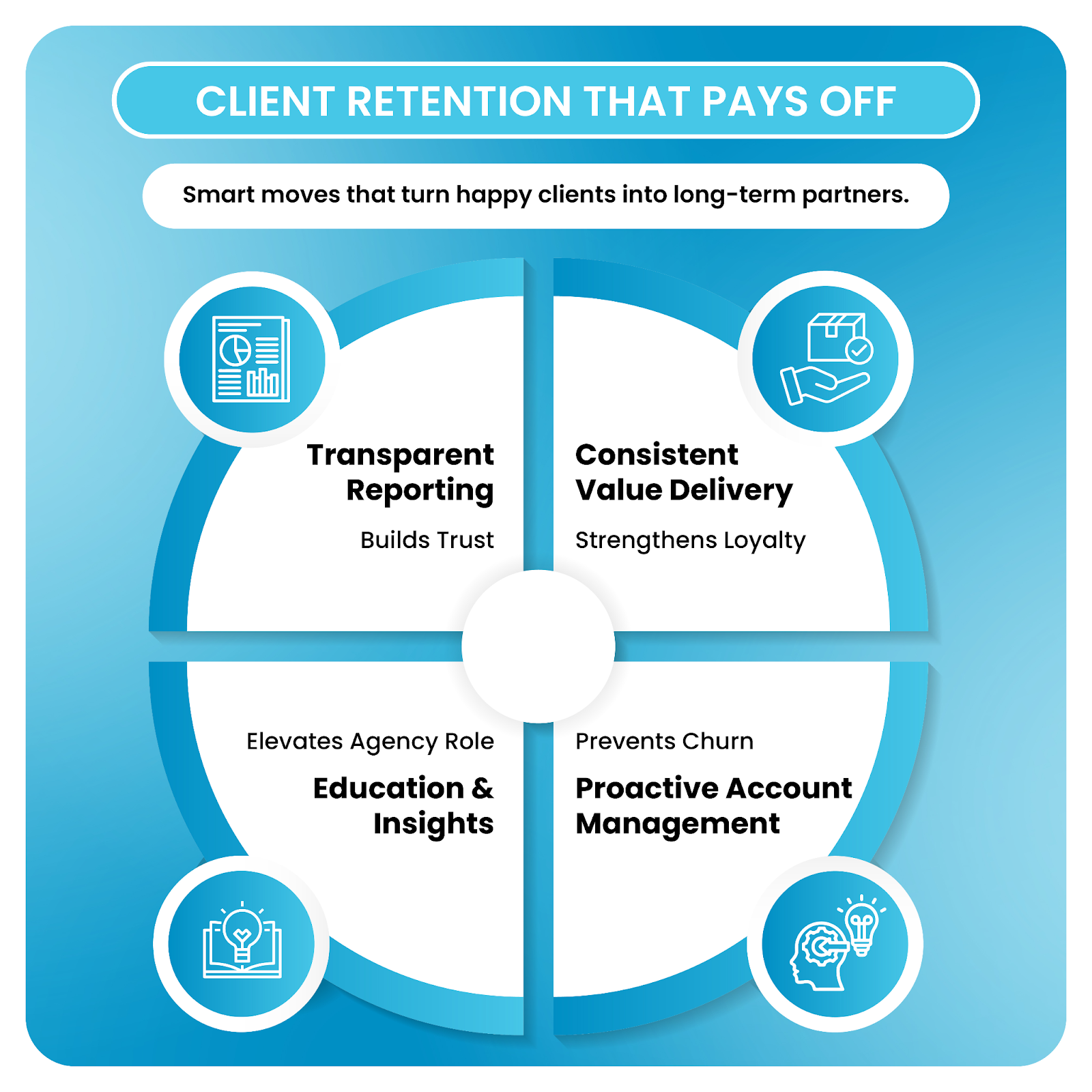
2. Inconsistent Facebook Ad Performance Erodes Client Trust
Facebook ad performance naturally fluctuates. Rising competition, platform changes, and higher CPMs make consistency harder to maintain. In 2024, average Facebook CPMs ranged between $10 and $14 across many industries, putting more pressure on efficiency and optimization. On top of that, frequent algorithm updates can quickly shift what works and what does not.
Creative fatigue is another major factor. When ads run too long without refresh, click-through rates can drop by 20% to 30%. If agencies are slow to respond, these dips become visible in reports. Clients notice rising costs, lower engagement, and reduced returns.
When performance feels unpredictable, trust begins to weaken. Clients ask more questions, request frequent updates, and become cautious about increasing spend. Over time, this uncertainty makes renewals harder and limits opportunities for budget growth.
3. Limited Bandwidth Prevents Strategic Account Growth
Most agency teams are overloaded. Daily optimizations, reporting, troubleshooting tracking issues, and responding to client requests take up a large portion of the workweek. Industry surveys show that media buyers can spend up to 40 percent of their time on routine maintenance instead of strategy.
This leaves very little room for higher-level work, such as:
- Long-term growth planning
- Educating clients on performance trends
- Creating quarterly or annual roadmaps
Account managers often operate in a reactive mode, solving problems instead of guiding growth. Without time for strategy, accounts stay stuck in maintenance mode. This limits how much value agencies can deliver and slows LTV growth over time.
4. Poor Measurement of LTV-Focused Metrics
Another challenge is how performance is measured and reported. Many agencies rely heavily on surface-level KPIs like CPC, CPA, or short-term ROAS. These metrics are easy to track, but they do not show whether campaigns are driving long-term profitability.
Important insights are often missing, including:
- Customer acquisition cost compared to lifetime value
- ROAS influenced by retention and repeat purchases
- Revenue generated after the first conversion
Weak attribution and incomplete funnel tracking make it difficult to connect Facebook ads to long-term outcomes. When clients only see short-term results, the full value of the service is unclear. This lack of visibility reduces confidence and increases the likelihood of churn.
5. Scaling Client Accounts Without Breaking Quality
As agencies grow, maintaining the same level of quality becomes more difficult. With more accounts to manage, creative testing often slows down. Optimization becomes less detailed, and strategies start to look similar across clients.
Instead of tailored growth plans, performance becomes standardized. Over time, this leads to stagnation. Results level off, LTV stops growing, and clients begin exploring other options. Scaling without strong systems and support can quietly damage long-term revenue, even when the agency appears to be growing on the surface.
How White Label Facebook Ads Increase Client LTV?
1. Shifting Facebook Ads from Campaign Delivery to LTV Engineering
White label teams approach Facebook ads with a long-term mindset. Instead of focusing only on launching campaigns and hitting short-term targets, they design strategies around the full customer lifecycle. The goal is not just to acquire users, but to turn those users into repeat buyers and long-term customers.
This approach prioritizes retention, repeat purchases, and sustained revenue growth. Campaigns are structured to guide users from initial awareness through consideration, conversion, and post-purchase engagement. Facebook ads stop being a one-time acquisition tactic and become a continuous growth channel that supports long-term client value.
2. Always-On Optimization Improves Performance Stability
One of the biggest advantages of white label Facebook advertising is consistent, daily optimization. Dedicated specialists monitor performance closely, test new creatives, refresh audiences, and adjust budgets based on real-time data and trends.
This ongoing attention reduces sudden performance drops and limits volatility. More stable results build client confidence and reduce pressure during short-term fluctuations. Over time, this consistency supports stronger LTV-focused metrics, including:
- Blended ROAS measured over longer periods
- Cost per retained customer
- Revenue per acquired customer
When performance feels reliable, clients are more likely to renew contracts and increase budgets.
3. Full-Funnel and Retention-Focused Campaign Structures
White label Facebook advertising allows agencies to run more advanced campaign structures without overwhelming internal teams. Instead of relying on a single campaign type, accounts are supported by a full-funnel strategy that includes:
- Prospecting campaigns to reach new audiences
- Retargeting campaigns to re-engage warm traffic
- Reactivation campaigns for past customers
Using custom audiences and lookalikes built from high-LTV customers helps attract users who are more likely to convert repeatedly. Post-purchase campaigns reinforce loyalty and encourage repeat behavior, which directly increases lifetime value.
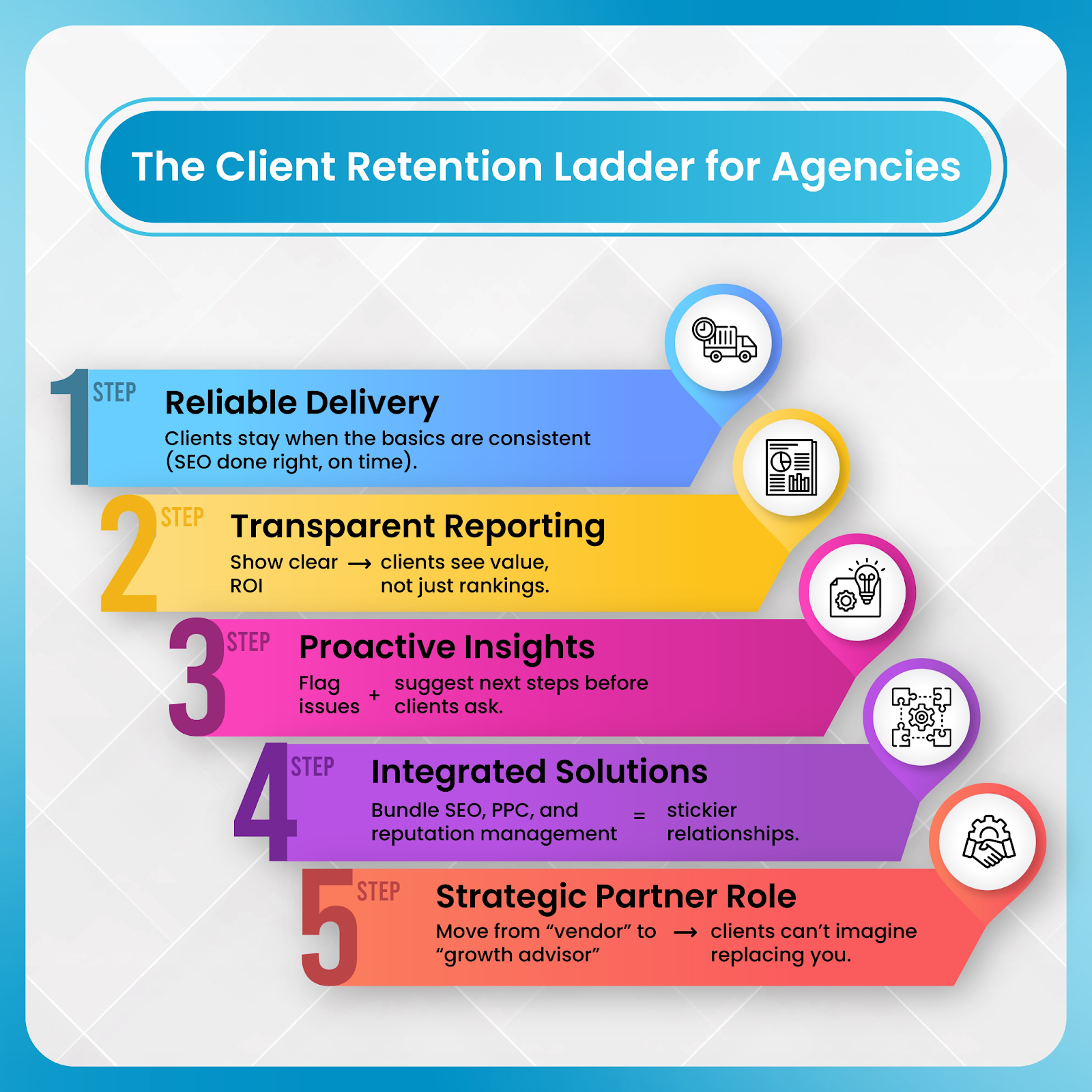
4. Advanced Tracking Enables True LTV Measurement
Improving LTV requires accurate data. White label Facebook ads teams often support advanced tracking setups such as Conversion API and server-side tracking. These systems help capture more complete and reliable conversion data.
With better attribution, agencies can clearly see how Facebook ads contribute to long-term revenue, not just first-touch conversions. This visibility makes it easier to measure LTV-to-CAC ratios and overall profitability. When clients understand the full impact of their ad spend, the perceived value of the service increases.
5. Creative Systems Designed for Longevity
Creative fatigue is one of the most common reasons performance declines over time. White label teams address this by using structured creative systems designed for long-term use rather than constant trial and error.
These systems often include:
- Angle-based testing to explore different messaging approaches
- Offer sequencing to guide users through the buying journey
- Creative refresh calendars to prevent burnout
By planning creative updates in advance, campaigns maintain more stable CTRs and lower CPAs. This consistency supports steady account growth and higher lifetime value.
6. More Time for Agencies to Strengthen Client Relationships
When execution is handled by white label experts, agencies regain valuable time. This time can be redirected toward strategic work such as performance reviews, client education, and future planning.
Stronger relationships lead to clearer communication and better alignment on goals. Studies consistently show that clients who feel supported and informed stay longer and spend more over time. Relationship-building becomes a direct contributor to higher LTV.
7. Predictable Delivery Enables Account Expansion
Consistency creates momentum. When results are predictable, clients feel more confident increasing budgets, testing new funnels, or expanding into additional channels. Predictable delivery turns performance discussions into growth conversations.
White label Facebook ads help agencies transform client accounts into long-term revenue assets rather than short-term projects. This predictability plays a major role in improving LTV across an agency’s entire client base.
How DashClicks’ White Label Facebook Ads Help Agencies Increase Client LTV?
DashClicks offers white label Facebook ad management designed specifically for agencies that want to grow client lifetime value without losing control of their brand or client relationships. The focus goes beyond launching campaigns and chasing short-term metrics. Instead, the service is built around long-term performance, consistency, and scalable growth.
Each agency is supported by dedicated Facebook ad specialists who manage day-to-day optimization, creative testing, and audience strategy. This hands-on approach ensures every account receives consistent attention, even as agencies scale. Ongoing optimization helps reduce performance swings, which builds confidence with end clients and strengthens trust over time. Campaigns are structured to support the full funnel, from customer acquisition to retention and repeat purchases.
DashClicks also places strong emphasis on accurate measurement and visibility. With support for Conversion API integration and improved attribution, agencies gain clearer insight into how Facebook ads contribute to long-term revenue. Instead of relying only on short-term ROAS, agencies can track deeper performance metrics that reflect true lifetime value. This makes it easier to explain results, justify spend, and align campaigns with long-term business goals.
Rebrandable reporting further reinforces agency credibility. Agencies can present clear, professional insights under their own brand, helping clients understand performance without confusion or gaps in data. This transparency strengthens relationships and positions the agency as a strategic partner rather than just a service provider.
By handling execution, optimization, and technical complexity, DashClicks gives agencies the freedom to focus on what matters most. More time can be spent on strategy, growth planning, and relationship building. This balance between performance delivery and partnership is a key reason DashClicks’ Facebook ads services help agencies increase client LTV over the long term.
Closing Thoughts on LTV and the Future of Agency Growth
Agencies that focus on lifetime value consistently build stronger, more profitable businesses than those chasing short-term ROAS. Client LTV reflects more than campaign performance. It represents trust, consistency, and alignment between agency strategy and client goals. This value is built over time through systems that support retention, repeat growth, and measurable long-term results.
White label Facebook ads are not about losing control of accounts or relationships. They are about gaining leverage. With expert execution handled in the background, agencies can maintain performance quality while dedicating more time to strategy, communication, and growth planning.
As competition continues to rise and margins become tighter, success in 2025 will depend on long-term thinking. Agencies that treat Facebook ads as a sustainable growth engine and prioritize client relationships as their most valuable asset will be best positioned to grow, retain clients, and increase lifetime value across their portfolio.
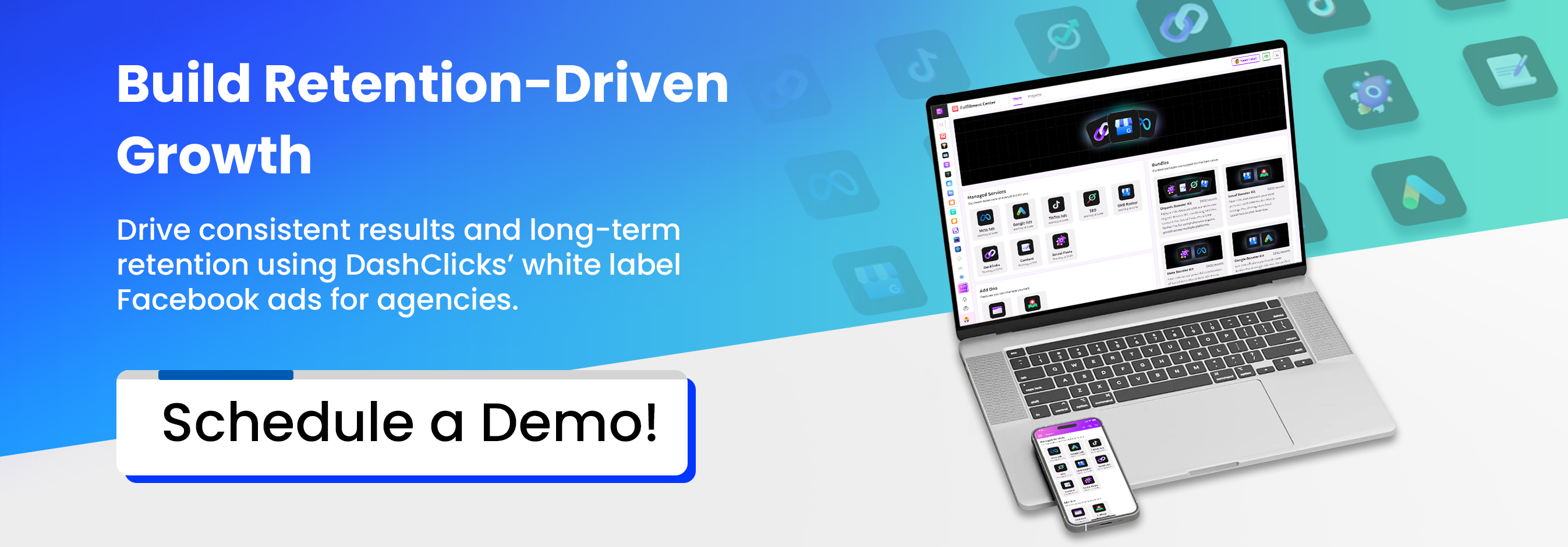

Affiliate Marketing on LinkedIn Best Practices for Sustainable Growth
Affiliate marketing has been around for a long time. Many people think of it as writing blogs, adding links, or posting product reviews on websites. Some think of YouTube videos or Instagram stories with discount codes.
But affiliate marketing on LinkedIn is very different.
LinkedIn is not a shopping platform. People don’t come here to browse products or look for deals. They come to learn, grow their careers, improve their businesses, and connect with other professionals.
That’s why affiliate marketing on LinkedIn requires a completely different mindset. If you try to sell aggressively, drop links everywhere, or copy strategies from other platforms, it usually doesn’t work.
However, when done the right way, LinkedIn can become one of the best platforms for long-term and sustainable affiliate income.
This blog explains how affiliate marketing really works on LinkedIn, what best practices look like today, and how you can grow without hurting your personal brand or credibility.
Why LinkedIn Is a Unique Platform for Affiliate Marketing?
To succeed with affiliate marketing on LinkedIn, you must first understand how people behave on the platform.
People use LinkedIn to:
- Learn from real experiences
- Follow industry experts
- Discover tools that solve work-related problems
- Make smart decisions, not quick ones
They do not come to LinkedIn to:
- Click random affiliate links
- Be pushed into buying something
- See promotional or sales-heavy posts
LinkedIn is built on trust. People follow you because they believe you know what you’re talking about. Once that trust is broken, it is very hard to rebuild.
That’s why affiliate marketing here is slow at first—but very powerful in the long run.
Think Long-Term, Not Quick Money
One of the biggest mistakes people make is expecting fast results.
Affiliate marketing on LinkedIn is not about:
- Posting one viral post
- Making money in a week
- Pushing one product again and again
Instead, it’s about:
- Building credibility
- Showing real knowledge
- Helping people before selling anything
Most successful LinkedIn affiliates didn’t start by promoting tools. They started by sharing:
- Lessons from their work
- Mistakes they made
- Things they learned over time
The affiliate income came later.
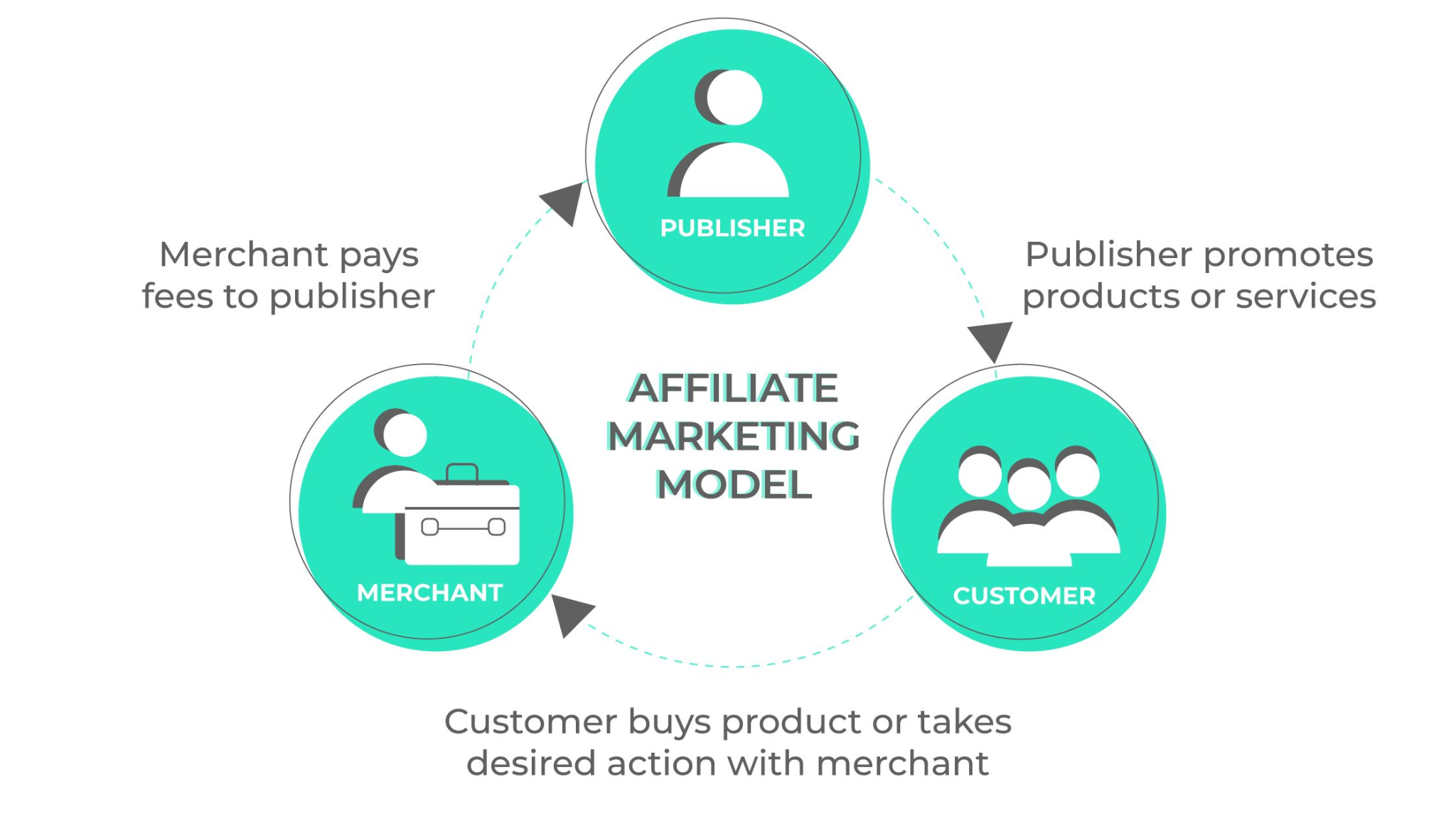
Step One: Build a Strong Personal Profile
Your LinkedIn profile is your foundation. Before people click your links, they click your profile.
If your profile looks confusing, salesy, or empty, people won’t trust your recommendations.
How to Optimize Your Profile (Without Selling)?
Headline:
- Focus on what you do and who you help
- Avoid adding affiliate links or tool names
Example: Helping SaaS founders grow with content and systems
About Section:
- Write like a human
- Share your journey, experience, and interests
- Explain what problems you understand
This section should answer one simple question: “Why should I listen to this person?”
Featured Section:
- Add useful posts, guides, or educational content
- Avoid direct affiliate landing pages
Your profile should build trust before asking for attention.
Step Two: Choose Affiliate Products That Fit LinkedIn
Not all affiliate products work on LinkedIn.
LinkedIn works best for:
- B2B tools including B2B lead generation
- SaaS products
- Marketing, sales, HR, or productivity tools
- Services used by professionals
Products that usually fail:
- Cheap consumer products
- Hype-based tools
- “Get rich quick” offers
Before promoting anything, ask yourself:
- Have I used this tool myself?
- Would I recommend this to a colleague?
- Can I talk honestly about its pros and cons?
If the answer is no, don’t promote it.
Step Three: Content Comes First, Affiliate Links Come Later
On LinkedIn, content is everything.
People don’t follow you for links. They follow you for insights.
What Good Affiliate Content Looks Like?
Good affiliate content:
- Talks about a real problem
- Shares a personal experience
- Explains what worked and what didn’t
- Mentions tools naturally, not forcefully
Here is an example of LinkedIn’s “Articles” section. An effective approach is to write an educational piece on the topic and weave the advertiser’s product into the content in a natural, contextual way.
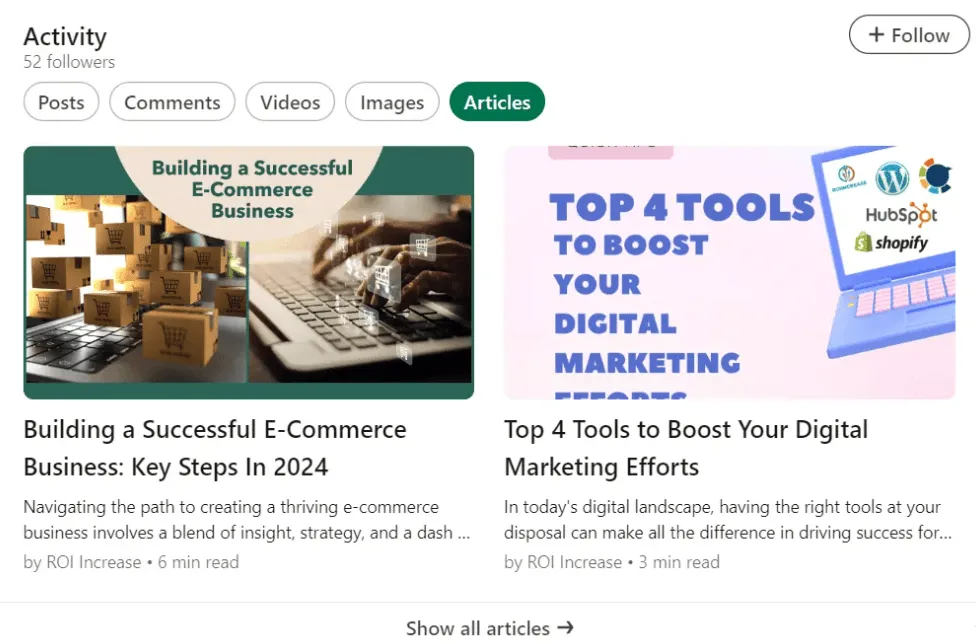
Image Source: LinkedIn
Bad affiliate content:
- Looks like an ad
- Focuses only on features
- Pushes links without context
Many top LinkedIn creators don’t even place affiliate links in their posts. They:
- Put links in comments
- Share links only when people ask
- Add links to their profile or newsletter
This feels more natural and builds trust.
As your content and audience grow, maintaining consistency without sacrificing quality becomes challenging—especially for agencies and consultants managing multiple clients.
This is where white label content services can support sustainable growth. Instead of rushing posts or outsourcing randomly, structured white-label solutions allow professionals to deliver high-quality, on-brand content while staying focused on strategy and relationships.
Platforms like DashClicks offer white label content services designed for agencies that want to scale content creation without turning their LinkedIn presence into a promotional feed. These services help ensure content remains insight-driven, audience-focused, and aligned with long-term brand credibility—exactly what LinkedIn rewards.
The key is using white label support as a backend system, not a shortcut. When content still reflects real experience and thoughtful perspectives, tools and services simply help you stay consistent without diluting trust.
Use Simple Stories Instead of Sales Copy
You don’t need fancy words or marketing language.
Simple stories work better.
For example:
- “I struggled with this for months…”
- “I made this mistake early on…”
- “This tool didn’t work for me at first, here’s why…”
These posts feel real. People relate to them.
When you share your experience honestly, people become curious about what you use. That’s when affiliate marketing happens naturally.
Be Honest and Transparent
Transparency is very important on LinkedIn.
If you earn money from a recommendation:
- Say it clearly
- Don’t hide it
- Don’t exaggerate results
You can say something simple like: “This is an affiliate link, but I use this tool myself.”
Surprisingly, being honest often increases trust instead of reducing it.
People don’t mind affiliate links. They mind dishonesty.
Consistency Matters More Than Frequency
You don’t need to post every day.
But you do need to post consistently.
Even:
- 2–3 posts per week
- With helpful insights
- Written in your own voice
is enough to build authority over time.
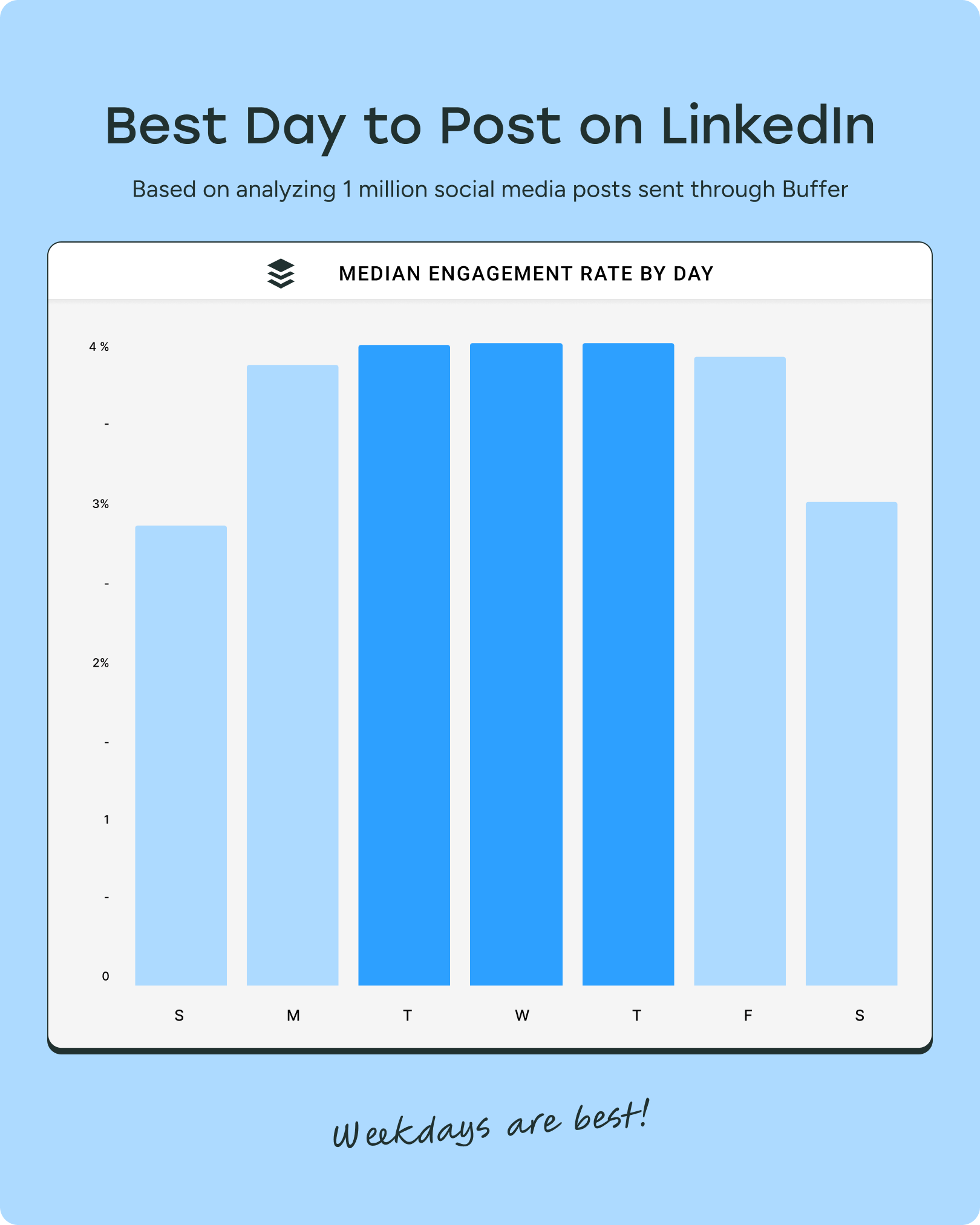
Image Source: Buffer
Affiliate success on LinkedIn is about showing up regularly, not being everywhere.
Engage With Others (This Is Very Important)
Affiliate marketing on LinkedIn doesn’t only happen through posts.
A lot of it happens through:
- Comments
- Conversations
- DMs
When you:
- Leave thoughtful comments
- Share helpful replies
- Add value to discussions
People start recognizing your name. Later, when you mention a tool or share an experience, they pay attention. This silent trust-building is powerful.
Use Educational Content as a Bridge
Instead of promoting tools directly, teach people how to think.
Examples:
- How to choose the right software
- Common mistakes when picking tools
- Things to look for before buying
Inside this content, you can mention tools naturally.
This approach:
- Feels helpful
- Avoids promotion
- Builds authority
And it works very well on LinkedIn.
Using Tools to Stay Consistent
Writing consistently can be hard. Many people struggle with:
- Writer’s block
- Finding ideas
- Staying regular
This is where tools can help.
Postwise.ai is one such AI-powered social media content tool. It helps individuals, creators, and businesses write, schedule, and improve content for Linkedin and other online platforms. Many users rely on it to save time, generate ideas, and stay consistent without staring at a blank screen every day. Similarly, incorporating the best linkedin automation tools helps you stay ahead and remain consistent. To stay focused on content and conversations without inbox noise, many creators also choose to stop LinkedIn emails and unsubscribe from LinkedIn notifications while building their affiliate presence on the platform.
That said, not every tool fits every creator. Some people want more control, others prefer different writing styles or workflows. That’s why creators often explore Postwise alternatives based on their personal needs and content strategy.
Avoid Chasing Virality
Viral posts look exciting, but they don’t always lead to affiliate income.
On LinkedIn:
- A small audience of the right people is better
- Decision-makers matter more than impressions
A post with:
- 40 thoughtful comments
- From founders, marketers, or buyers
can outperform a post with thousands of likes from random users.
Focus on relevance, not reach.
Measure the Right Signals
Likes and impressions are not the best indicators of affiliate success.
Better signals include:
- Profile visits
- People saving your posts
- DMs asking questions
- Repeat engagement
These show that trust is building.
Affiliate income on LinkedIn often takes weeks or months. That’s normal.
Common Mistakes to Avoid
- Promoting Too Early: Build trust first.
- Sounding Like an Advertisement: Write like a person, not a brand.
- Overusing Links: Less is more.
- Copying Other Platforms: LinkedIn needs context and depth.
Sustainable Growth Takes Time
Affiliate marketing on LinkedIn is not a shortcut.
It’s a long-term strategy built on:
- Trust
- Consistency
- Honest communication
When people trust you, they don’t question your recommendations. They value them.
That’s when affiliate marketing stops feeling like marketing and starts feeling like advice.
Final Thoughts
LinkedIn is one of the best platforms for sustainable affiliate marketing—but only if you respect the platform and its audience.
Help first.
Share real experiences.
Be honest.
Think long-term.
Do that, and affiliate growth will come naturally—slowly, steadily, and sustainably.

Why Visual and Structured Content Wins in AI Search?
Your content might already be shaping how people understand your topic, even if they’ve never visited your website.
Let’s get one thing out of the way first. Visual and structured content didn’t start working because of AI. It was already useful long before that. What changed is where people now encounter information.
They don’t always land on your page first. Sometimes they don’t land at all. They see explanations, summaries, and blended answers pulled from many places. In that environment, messy content doesn’t disappear because it’s bad — it disappears because it’s hard to reuse.
This is where structure and visuals quietly become a big deal. The problem is not AI. The problem is compression.
The Problem Is Not AI. The Problem Is Compression
Most modern discoveries work by compression. Long explanations get shortened. Detailed articles get summarized. Multiple sources get blended. This happens everywhere now.
When information is compressed, only certain parts survive:
- Clear definitions
- Clean structures
- Obvious relationships
- Simple visuals
Everything else fades away. Unstructured text doesn’t compress well. It loses meaning.
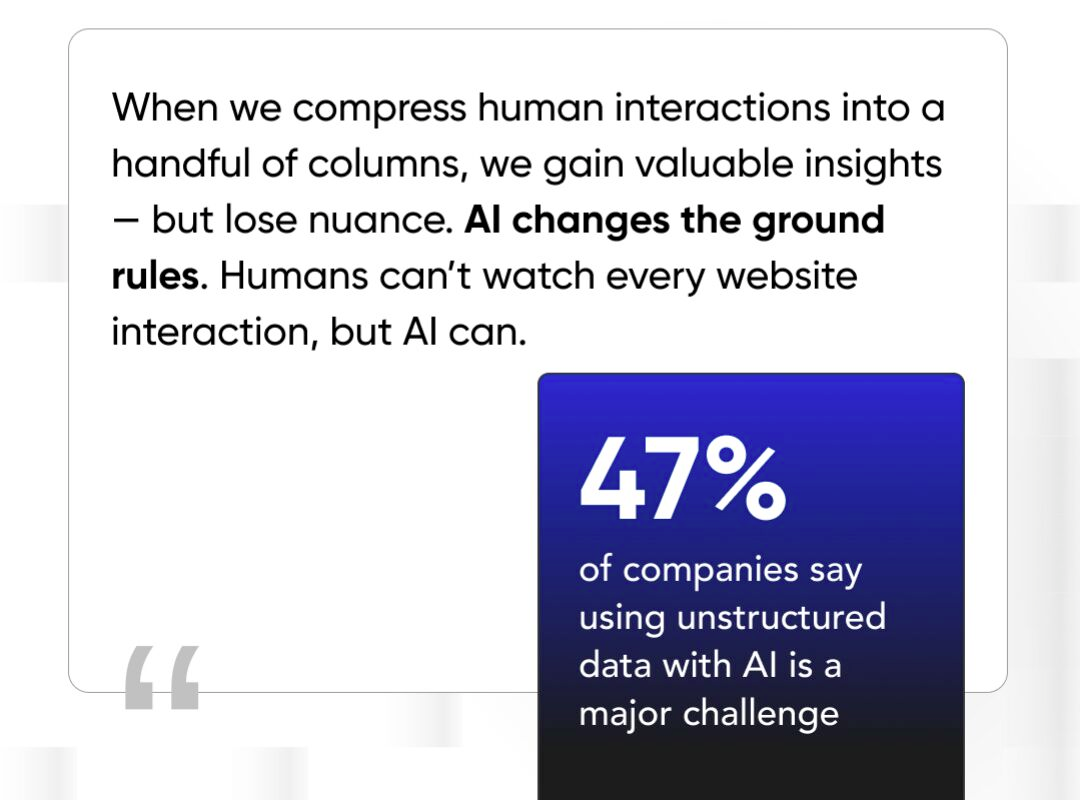
Image Source: LinkedIn
Visual and structured content holds together longer. That’s the real reason it “wins.”
What “Winning” Actually Means in AI Search Contexts?
Winning doesn’t mean ranking first. It doesn’t mean getting all the clicks.
Often, it just means:
- Your explanation still makes sense when shortened
- Your idea isn’t distorted
- Your brand doesn’t disappear entirely
That’s a low bar, but it’s realistic.
When people read AI-generated answers, they’re often reading a condensed version of many sources. If your content was clear to begin with, it has a better chance of being represented accurately.
If it wasn’t, it gets blended into generic noise.
Visibility Is Hard to See Without the Right Lens
This is where the idea of visibility becomes tricky.
- You might not see traffic.
- You might not see impressions.
- You might not see referrals.
But your content could still be shaping how a topic is understood.
Teams start using an AI brand visibility tool to observe how their brand shows up in AI-generated answers across different platforms. Not to control anything. Just to understand representation and adjust their content strategy.
That kind of visibility isn’t about optimization tricks. It’s about feedback. And feedback matters when you’re not directly in the loop.
Structured Content Is Easier to Understand
Let’s ignore AI for a second. Structured content is easier for humans too. When someone lands on a page and sees:
- Clear headings
- Short sections
- Logical progression
- Lists where they make sense
They relax. They know what’s coming. They know where they are. This matters even more when attention is low and search intent is high. People don’t want to work hard to understand something. They want help understanding it.
Structure helps.
Visuals Are Not Decoration, They’re Anchors
A lot of people think visuals are about engagement. That’s partly true. But for complex topics, visuals do something more important.
They anchor meaning. A simple diagram can:
- Clarify relationships
- Reduce misinterpretation
- Replace paragraphs of explanation
When content is reused or summarized, visuals often shape how the explanation is interpreted, even if the image itself isn’t shown.
The idea survives because the thinking was clear.
Walls of Text Collapse Under Reuse
Here’s something you can test yourself.
Take a long, unstructured article. Try to summarize it in a few sentences without losing meaning. It’s hard. Now take a well-structured piece with headings and visuals. The summary almost writes itself.
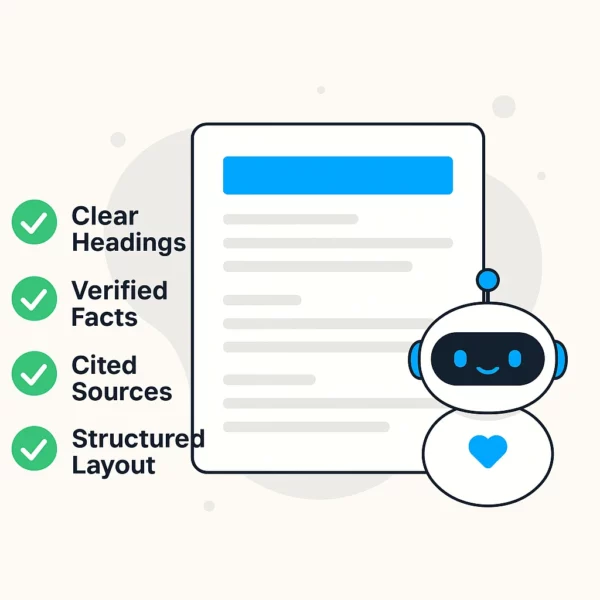
Image Source: ROI Minds
That’s not an accident.
When content is reused by others, structured pieces are easier to reference, paraphrase, and combine. Messy content forces interpretation. And interpretation leads to distortion.
This is why some agencies are moving toward structured, reusable content systems instead of one-off blog writing. DashClicks’ white label content services follow this logic by designing content that holds its meaning when reused, summarized, or blended across platforms.
Clarity Is the Only Thing That Travels Well
In modern discovery environments, clarity travels.
- Not tone.
- Not personality.
- Not clever phrasing.
Clear explanations survive being shortened. Everything else degrades. Visuals help with clarity. Structure reinforces it.
That’s why these formats keep showing up, even when nobody explicitly planned for it.
For teams producing content at scale, this is not just a writing preference, it is an operational need. DashClicks supports this by delivering white label content that is built for clarity first, not keyword stuffing or surface-level SEO.
Why Does This Matters for Brands?
This is not just a content formatting issue. It is a business one.
When your ideas are reused, summarized, or interpreted by others, they shape how your brand is understood. Even when no one clicks through, your thinking can still influence decisions.
This affects every major content type.
- Sales Pages: If your value is not clearly structured, it gets reduced to generic claims. When your message is compressed, only the clearest benefits survive. The rest fades into noise.
- Service Pages: When your process and differentiation are unclear, your services start sounding like everyone else’s. Structure protects what makes you distinct.
- Educational Blogs: These are often the source material for summaries and explanations. If they are vague or unstructured, your ideas will be blended into the crowd. If they are clear, your perspective is more likely to be represented accurately.
- Brand Positioning: Over time, repeated exposure to clear, consistent explanations shapes how people remember you. Not through slogans, but through the way you break down problems.
Clarity changes how people feel about you:
- It builds trust, because your thinking feels reliable
- It increases buying confidence, because people understand what you actually do
- It improves brand memory, because your ideas have a recognizable structure
- It strengthens authority perception, because disciplined structure signals expertise
This is how content creates influence even when you are not present to explain it.
This Is Not About Writing for Machines
It’s tempting to think this is about “formatting for AI.” It’s not. It’s about writing for reuse.
When information moves through systems, tools, summaries, and conversations, it needs to stay intact. Structure and visuals protect meaning.
That’s the entire strategy.
Structured Content Reduces Ambiguity
Ambiguity is dangerous in technical or business topics.
If two people read the same content and come away with different interpretations, something went wrong. Structure reduces that risk:
- Clear definitions reduce confusion
- Ordered steps reduce misreading
- Tables and lists reduce assumptions
This matters more when content is consumed indirectly. You’re not there to explain what you meant.
Visuals Help When Language Falls Short
Some ideas are just hard to explain with text alone.
- Processes.
- Comparisons.
- Flows.
- Dependencies.
Visuals fill that gap. They don’t replace explanation, but they support it.
When content is summarized later, the visual logic often guides the shortened explanation, even if the visual itself isn’t visible.
That’s influence without control.
Not All Visuals Help (Some Hurt)
Let’s be clear. Decorative visuals don’t help much. Stock photos rarely add clarity.
What works:
- Simple diagrams
- Labeled flows
- Comparison tables
- Step-by-step visuals
What doesn’t:
- Generic illustrations
- Abstract art
- Visuals with no labels
- Charts without context
If a visual doesn’t explain something faster than text, it’s probably not helping.
Structure Forces Better Thinking
This part is uncomfortable but true. When you structure content properly, you expose gaps in your own thinking. You notice:
- Missing steps
- Weak transitions
- Unsupported claims
Unstructured writing lets these problems hide. Structure forces discipline. And disciplined thinking reads as authority.
That’s why structured content often feels more credible, even when the ideas aren’t new.
Visual Content Slows Down Misinterpretation
When content is reused, misinterpretation is a real risk. Visuals slow that down. They give context. They show relationships. They limit how far an idea can be twisted.
This doesn’t mean visuals prevent misunderstanding completely. But they reduce it. And reduction matters at scale.
High-Intent Readers Scan Before They Read
This is important. People with intent don’t read line by line at first. They scan. They look for:
- Headings
- Diagrams
- Lists
- Clear sections
If they don’t find them, they bounce or skim poorly. Structured content respects how people actually behave.
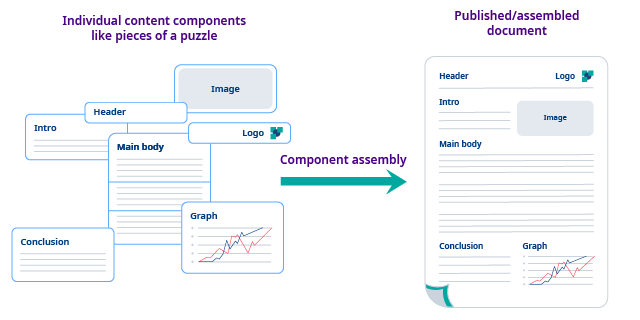
Image Source: RWS
Visuals give them confidence that the content is worth their time.
AI Search Didn’t Create This Behavior
This behavior existed before AI summaries. AI just amplified it. Now, scanning happens earlier. Sometimes before a click.
If your content doesn’t scan well, it doesn’t get a chance to explain itself. That’s not unfair. It’s just reality.
Structure Makes Updates Easier
This is a practical benefit people overlook. Structured content is easier to update. You can:
- Fix one section without rewriting everything
- Replace a visual without touching the text
- Add clarification where confusion appears
This keeps content accurate over time. Accuracy builds trust. Even quietly.
Visual Consistency Builds Brand Memory
When visuals follow a consistent logic, people start recognizing them. Not logos. Not colors necessarily. Patterns.
The way you explain things. The way you break down ideas. That recognition builds familiarity, even when brand names aren’t front and center.
This matters when discovery is indirect.
Structured Content Is Kinder to the Reader
This sounds simple, but it’s often forgotten. Structure is kindness. It says:
- “I know your time is limited.”
- “I won’t make you work harder than needed.”
- “I’ll guide you.”
People respond to that, especially when they’re trying to make decisions.
This Is Not a Hack. It’s Maintenance
Visual and structured content isn’t a growth hack. It’s maintenance.
It keeps your ideas understandable as they move through different environments. It reduces decay.
In a world where information is constantly reused, maintenance is strategy.
What Teams Should Actually Focus On?
If you strip everything down, focus on this:
- Clear headings
- One idea per section
- Visuals that explain, not decorate
- Simple language
- Logical flow
That’s it. No special tricks. No optimization games. Just content that holds up when it leaves your control.
Many agencies understand this framework but struggle to apply it consistently. White label content services by DashClicks exist to make this structure repeatable across clients, pages, and campaigns, without sacrificing meaning.
Final Thought
Visual and structured content doesn’t win because systems reward it. It wins because meaning survives longer.
When explanations travel, clarity is the only thing that makes the trip intact. AI search didn’t change what good content looks like. It just made bad content easier to lose.
And in that environment, structure and visuals aren’t optional extras. They’re how your thinking stays recognizable when you’re not in the room.


No results found.
Please try different keywords.
Get Started with
DashClicks Today
Get found online, convert leads faster, generate more revenue, and improve your reputation with our all-in-one platform.
.svg)
Unlimited Sub-Accounts
.svg)
Unlimited Users
.svg)
All Apps
.svg)
All Features
.svg)
White-Labeled
.svg)
Active Community
.svg)
Mobile App
.svg)
Live Support
.svg)
100+ Tutorials
.svg)
Unlimited Sub-Accounts
.svg)
Unlimited Users
.svg)
All Apps
.svg)
All Features
.svg)
White-Labeled
.svg)
Active Community
.svg)
Mobile App
.svg)
Live Support
.svg)
100+ Tutorials
.svg)
Unlimited Sub-Accounts
.svg)
Unlimited Users
.svg)
All Apps
.svg)
All Features
.svg)
White-Labeled
.svg)
Active Community
.svg)
Mobile App
.svg)
Live Support
.svg)
100+ Tutorials



.svg)
.svg)
.svg)
.svg)
.svg)


